Feed aggregator
Goth Chick News: Exploring GalaxyCon’s Newest Addition – Nightmare Weekend
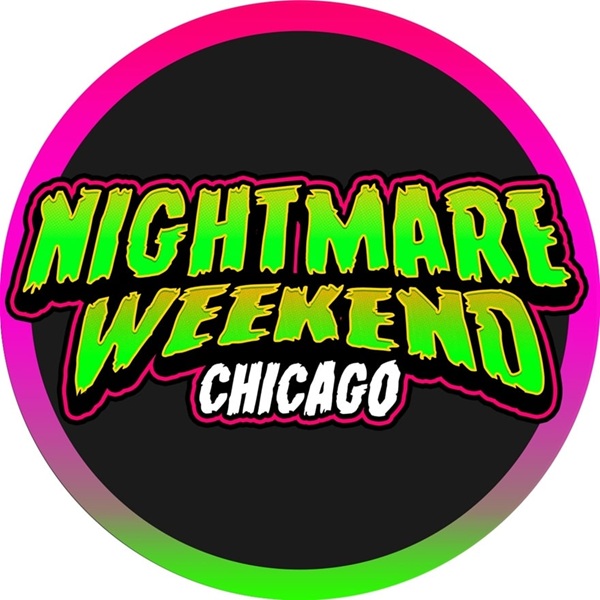 Nightmare Weekend Chicago 2025
Nightmare Weekend Chicago 2025
One of the most entertaining aspects of working for Black Gate is hitting the road with Photog Chris Z to cover horror-themed events in the Midwest. Though many people think about Halloween during the fall months, there is an enormous subculture of vendors, artists, and fans for whom the spooky season never ends. This year, Chicago was not only the site of an entirely new show just for this audience but also the first city to host it—and we had a front-row seat on opening night.
GalaxyCon, LLC, founded in 2006 by Mike Broder and based in Fort Lauderdale, Florida, is one of the leading organizers of pop culture conventions in the United States. Initially focused on comic books, anime, and broader fan engagement, GalaxyCon has successfully expanded its portfolio to include horror-themed entertainment with its Nightmare Weekend series.
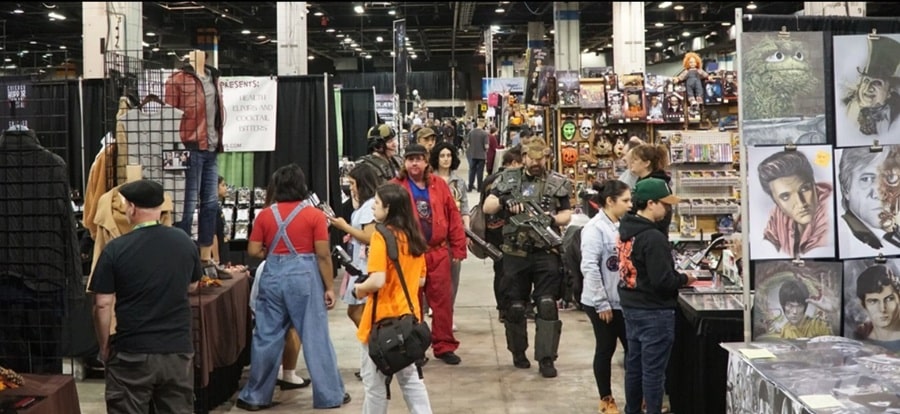 The crowd at Nightmare Weekend Chicago 2025
The crowd at Nightmare Weekend Chicago 2025
The expansion into horror began in response to the genre’s increasing popularity, particularly its blend of nostalgia, cult fandom, and crossover appeal to mainstream audiences. With Nightmare Weekend, GalaxyCon has carved out a distinct identity in the horror convention scene, blending celebrity meet-and-greets, specialized vendors, themed parties, and curated entertainment.
The Nightmare Weekend events (of which there are four more in other cities this year) reflect Broder’s business philosophy of engaging fans across diverse interests. “Horror is not just a genre; it’s a lifestyle for many fans,” Broder explained in a recent interview. “Nightmare Weekend is our way of celebrating the culture and giving horror enthusiasts a place to connect and indulge their passion.”
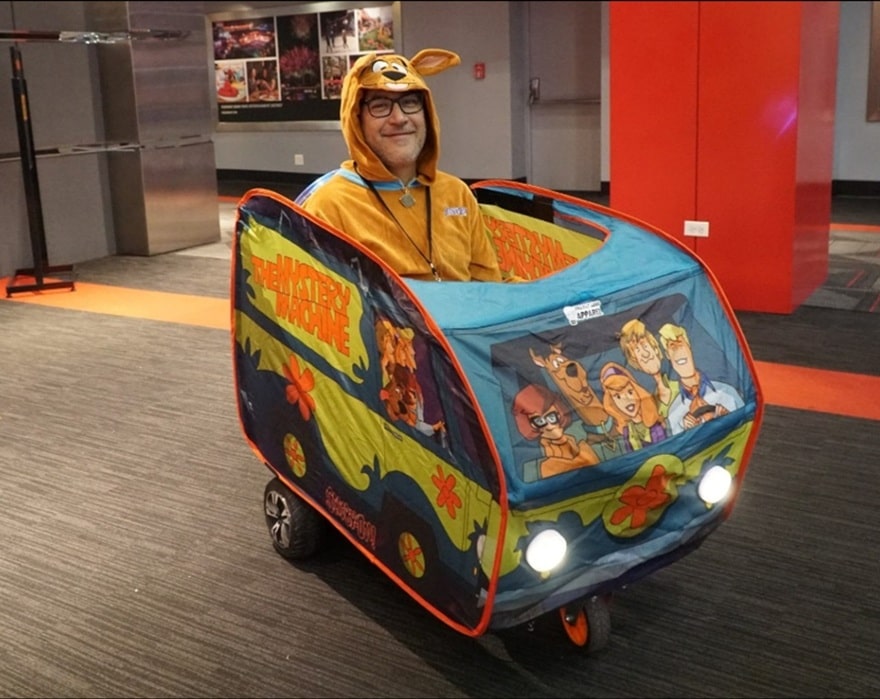 Best. Cosplay. Ever.
Best. Cosplay. Ever.
We were thrilled to get an invite to cover the inaugural event in Chicago last weekend. To start, there was an impressive lineup of celebrities, including William Shatner, Jeremy Renner, and Barry Bostwick just to name a few. Unfortunately, many of the top names only appeared on Saturday and Sunday so we missed them. Chris Z did get to meet his favorite cosplayer, Ashlynne Dae and we both had a chance to catch up with our favorite Munster, Butch Patrick, who is starting to feel like a member of the family.
Though GalaxyCon hasn’t released official stats for Nightmare Weekend Chicago, we counted roughly 100 artists in the “Artists Alley” area and over 150 vendors, who together occupied one of the largest halls in the Rosemont Convention Center. We inevitably saw a few people and products we had seen at other shows. However, we were thrilled at all the uniqueness we found. Here’s few in no particular order…
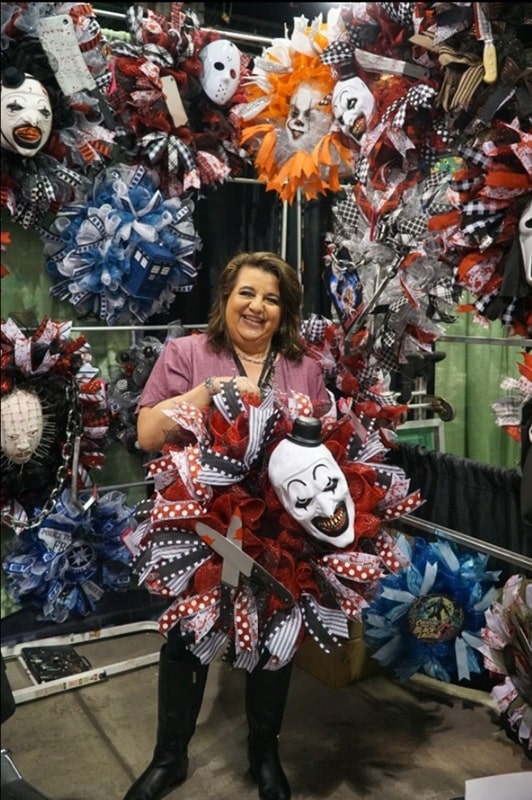 Soheyla Seiff and her incredible wreaths
Soheyla Seiff and her incredible wreaths
Seiffs Wreaths: Based in South Elgin, Illinois, Soheyla Seiff has been crafting handmade, custom wreaths since 2024. The company specializes in creating unique deco mesh wreaths that cater to a variety of themes, including holidays, special occasions, pop culture, and horror fandoms. Each wreath is meticulously designed to reflect its theme, offering customers a personalized touch to their decor. Notably, Seiff’s Wreaths has gained recognition for its horror-themed wreaths, featuring designs inspired by classic horror films and characters, making them a favorite among genre enthusiasts. Customers can explore and purchase these handcrafted creations through Seiff’s official website or their Etsy shop, where each piece is made with attention to detail and a passion for thematic artistry.
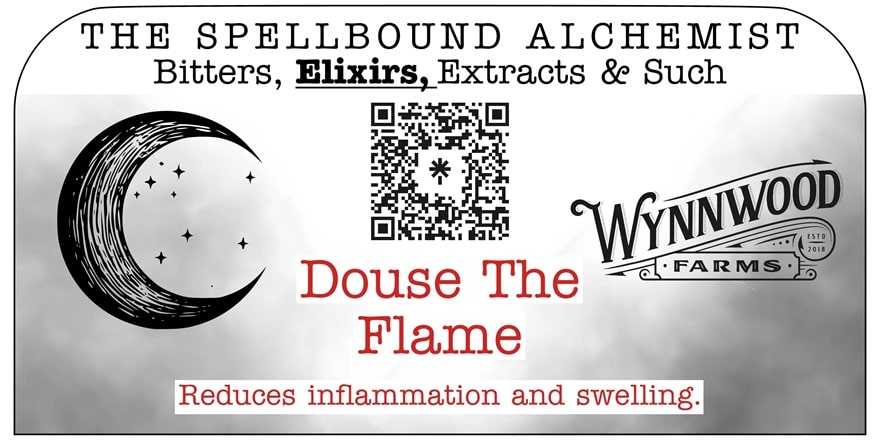 Wynnwood Farms Teas, Elixirs & Bitters
Wynnwood Farms Teas, Elixirs & Bitters
Wynnwood Farms Teas, Elixirs & Bitters: This boutique tea and apothecary brand, based in Houston, Texas, and owned by Alexandria and Debbie Wynn, offers a unique fusion of storytelling and sensory indulgence through their “Dead to Me Collective” collection. This curated selection features horror and storybook-themed teas, elixirs, and bitters, each crafted to transport consumers into a world of imagination and flavor.
The “Midnight Horror” tea line pays homage to classic horror narratives, with blends like “Dr. Frankenstein,” “Final Girl,” and “The Raven,” inviting tea enthusiasts to experience tales of terror and intrigue with every sip. Complementing these are their handcrafted elixirs and bitters from “The Spellbound Alchemist” series, meticulously produced in small batches by a mother-daughter duo. These concoctions, such as “The Lovers” cocktail bitters — a blend of chocolate, cherry bark, and vanilla — are designed to elevate both wellness routines and mixology experiences.
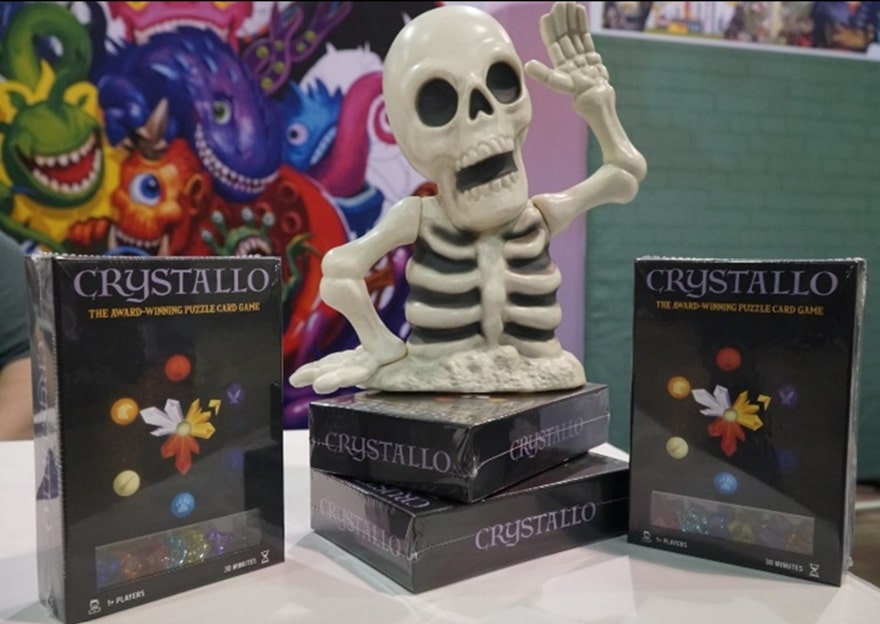 Crystallo Card Game
Crystallo Card Game
Crystallo Card Game: It wouldn’t be a convention without one of us picking up a new game. Though this isn’t “horror” per se, it is still a very cool concept. Plus, the shiny things attracted my attention. Crystallo, designed by Liberty Kifer, is a solo card game where players rescue magical creatures trapped by the Black Dragon’s crystal magic. Combining set collection and tile placement, the game challenges players to form crystal patterns and ultimately trap the dragon. With stunning artwork, tactile acrylic gems, and a 30-minute playtime, Crystallo offers an engaging and replayable experience for solo gamers. Expansions like “Untold Fortune” and “Den of Dragons” add depth and complexity to this enchanting adventure.
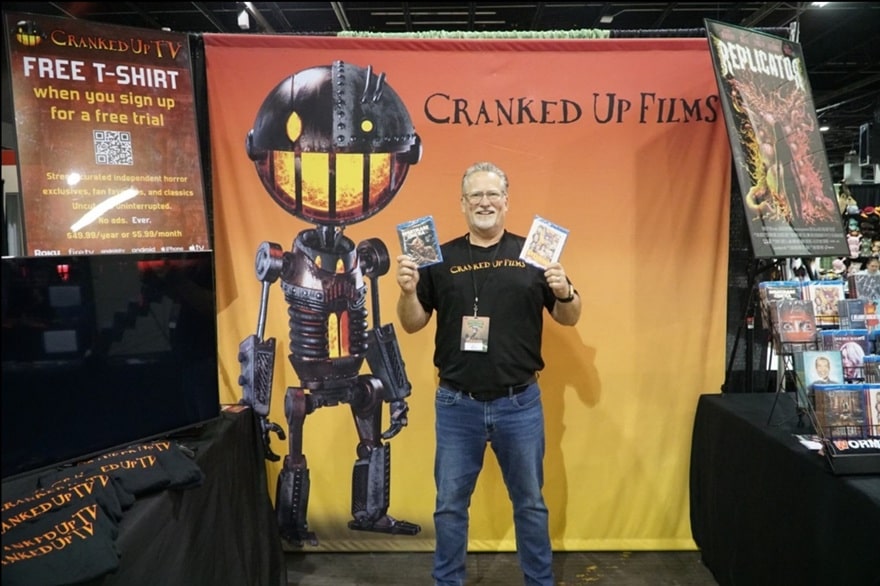 Scott Donley and Cranked Up Films/TV
Scott Donley and Cranked Up Films/TV
Good Deed Entertainment: Scott Donley is the founder and CEO of Good Deed Entertainment (GDE), an independent film studio established in 2012 and headquartered in Ashland, Ohio. Under Donley’s leadership, GDE has built a reputation for producing and distributing character-driven content across various platforms, including film, television, and digital media. The company is perhaps best known for releasing the Academy Award-nominated animated feature Loving Vincent, which tells the story of painter Vincent van Gogh in his signature style. In addition to Loving Vincent, GDE has distributed titles such as Karmalink, Carmen, and Some Freaks, along with the Independent Spirit Award-nominated To Dust and the Annie Award-nominated Charlotte.
Recognizing the growing interest in genre films, Donley launched Cranked Up Films, a division of GDE that focuses on high-concept horror, grounded sci-fi, and speculative fiction. This initiative has led to the production and distribution of films like Nightmare Cinema, a horror anthology featuring segments directed by notable filmmakers such as Mick Garris (Sleepwalkers, Critters 2) and Joe Dante (Gremlins, The Howling). Donley was at Nightmare Weekend promoting his newest venture, Cranked Up TV, the premier destination for ad-free, independent horror, so we now know where our next binge-watch will come from.
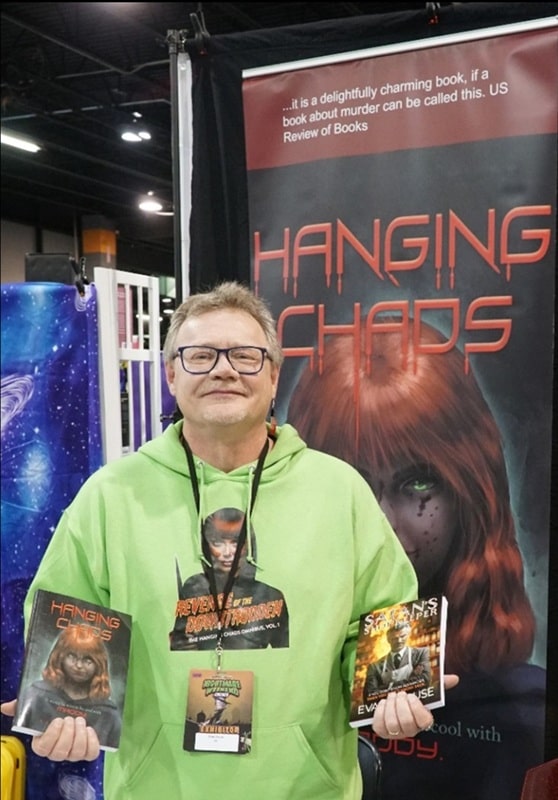 Author Evan Clouse of Hanging Chad Books
Author Evan Clouse of Hanging Chad Books
Hanging Chads Books: Evan Clouse, a former social worker turned author, has made a notable entry into the horror genre with his Hanging Chads series. Launched during what he humorously refers to as his “2/3-life crisis,” Clouse’s writing delves into dark, satirical narratives that blend horror, political commentary, and dark humor. The series follows Maddy Sommers, a vigilante serial killer targeting abusers and oppressors, offering readers a mix of gruesome justice and emotional depth. Clouse’s work has been recognized for its unique approach to horror, combining elements of mystery, love, and social critique.
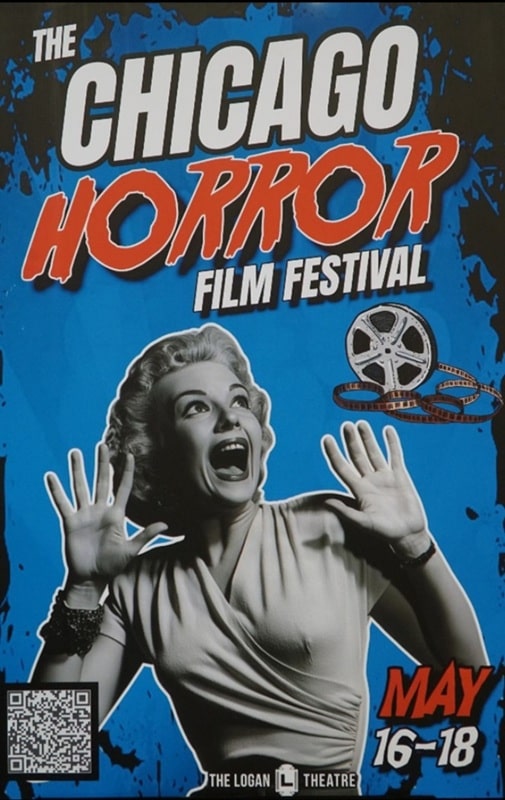 The Chicago Horror Film Festival 2025
The Chicago Horror Film Festival 2025
Last, we had to tell you about two other Midwest events coming soon. The Chicago Horror Film Festival 2025 celebrates its 26th year at the Logan Theater May 16-18. Touted as one of the top 10 horror festivals worldwide, CHFF showcases a curated selection of independent horror films from around the globe, including local and international shorts and features. Tickets start at just $10, with full weekend passes available for $68.99.
The Milwaukee Horror Con returns for its “Fall Frightmare” edition from September 5–7, 2025, at the Four Points by Sheraton Milwaukee Airport Convention Center. As Wisconsin’s only dedicated horror convention, this three-day event promises an immersive experience with horror legends, indie film screenings, themed vendors, cosplay contests, and late-night thrills.
As for GalaxyCon, they are aggressively broadening the reach of Nightmare Weekend to new cities in 2025, including:
- Nightmare Weekend Cleveland: August 29–31, 2025, at the Huntington Convention Center in Cleveland, Ohio.
- Nightmare Weekend Des Moines: September 12–14, 2025, at the Iowa Events Center in Des Moines, Iowa.
- Nightmare Weekend Richmond: October 17–19, 2025, at the Greater Richmond Convention Center in Richmond, Virginia.
- Nightmare Weekend Savannah: November 14–16, 2025, at the Savannah Convention Center in Savannah, Georgia.
A huge thanks to Justin Burkhardt and the Nightmare Weekend promotions team for including us in this first-ever event. We can’t wait for next year.
OUT NOW – The Counterfactual War
The Protectorate – an interdimensional empire that has conquered five timelines so far – has set its sights on ours. Led by a man willing to risk everything for power and conquest, armed with technology a hundred years ahead of ours – technology promising salvation to its allies and doom to its enemies – and drawing on a far deeper military history, the Protectorate Expeditionary Force has arrived to invade and incorporate our world into the greatest empire the multiverse has ever known, or die trying.
The United States has won a desperate battle against the crosstime invaders, but large swathes of the country remain under enemy occupation, the struggle to understand invader technology has barely begun and a new invasion force has appeared in the Middle East. As the country staggers and threatens to collapse, the military prepares for a major offensive that could make or break the war, while – deep in the heart of Texas – the invaders prepare a plan of their own …
One battle has been won. The war is far from over.
Download a FREE SAMPLE, then purchase from Amazon US, UK, CAN, AUS, Books2Read.

Spotlight on “The River is Waiting” by Wally Lamb
The River Is Waiting is the propulsive story of a young father who, after an…
The post Spotlight on “The River is Waiting” by Wally Lamb appeared first on LitStack.
On McPig's Radar - Never the Roses
Did I already post about this book before?
And did I already read it because I know the author and she gave me an early digital copy?
Yes! to both these questions.But this book is so good!
Believe me: you want it! It's utterly amazing and beautiful in and out!
Go preorder: I totally did.
 Never the Rosesby Jennifer K. Lambert
Never the Rosesby Jennifer K. LambertUNSTOPPABLE WAR. UNSPEAKABLE SINS. IMPOSSIBLE LOVE.
Genevieve Gornichec’s The Witch’s Heart meets Madeline Miller’s Circe in this epic and deeply emotional romantic fantasy debut by Jennifer K. Lambert. The hardcover edition features beautiful stenciled edges.
The Dread Sorceress Oneira has retired. She’s exhausted from fighting the endless wars of kings and queens, and has long accepted that her death is near. Alone at last but for a few uninvited companions―a near-mythical wolf, a goddess’s avatar, and a feline that embodies magic itself―Oneira realizes that she’s bored. On a whim, or perhaps at the behest of fate, she makes an unlikely trip to the most extensive library in existence: the home of her most powerful rival, the sorcerer Stearanos.
By recklessly stealing a book from him, Oneira inadvertently initiates a forbidden correspondence. Taunting notes and clever retorts reveal a connection neither has found―nor could ever find―in any other.
But Oneira soon learns that Stearanos, bound to a vile king, is tasked with waging war on the queen she once served. A relationship with him is far too dangerous to pursue despite their mutual desire―and yet, Oneira can’t seem to stay away.
A bond with Stearanos could alight the long-extinct flame of life within her… or it could destroy her entirely.
Expected publication July 8, 2025
Back to Life, Back to Reality and Book Recommendation
The vacation was amazing. The air was 80F. The ocean was 80F. The pools were great. The room was spectacular. The food was delicious. The drinks were to die for.



We went on a date to this restaurant that was technically part of the resort but set outside of the grounds, by a busy street. We sat on a terrace, under a canvas, watched the foot traffic and listened to a remarkably good live singer. At some point I had a moment of wondering if this was actually happening. It’s been so long since we had a vacation. Last year, we had a weekend in Daytona. That was it. I needed this in the worst way.
We swam so much. I miss it already.
We are back home, and the dishwasher drainage line is clogged. We’ve taken the dishwasher apart, checked the fan, and have done the boiling water trick, so it looks like we have to get a plumber involved. Reality, coming like a freight train.
Professional NewsThis Kingdom is a hot potato. We have now sold the rights to 5 foreign countries, most of which we cannot contractually disclose yet, but we are free to say that we will be working with Tor UK. We are very excited.
We have seen the cover sketches. They sent 3 sketches and all three were great. We picked a favorite and can’t wait to see it in color and detail. I don’t want to jinx it, so I won’t say more.
Book RecommendationI usually don’t read while we work. It’s very hard to shift gears from concentrating on the narrative to enjoying it. While on vacation, though, I downloaded a series through Kindle Unlimited and I glomed it. I’ve read 4.5 books at this point. Big thanks to Matt, Alisha, Sauron, and Christy for recommending the Azarinth Healer series.
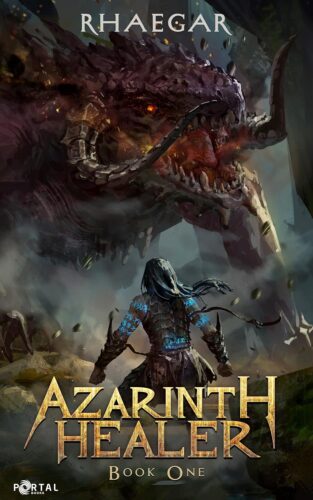
Ilea likes punching things. And eating.
Unfortunately, there aren’t too many career options for hungry brawlers. Instead, the plan is to quit her crappy fast-food job, go to college, and become a fully functioning member of society. Essentially – a fate worse than death.
So maybe it’s lucky that she wakes up one day in a strange world where a bunch of fantasy monsters are trying to kill her…?
On the bright side, ‘killing those monsters right back’ is now a viable career path! For she soon discovers her new home runs on a set of game-like rules that will allow her to punch things harder than in her wildest dreams. Well, maybe not her wildest dreams, but it’s close.
With no quest to follow, no guide to show her the way, and no real desire to be a Hero – Ilea embarks on a journey to discover a world full of magic. Magic she can use to fight even bigger monsters.
She’s struggling to survive, has no idea what will happen next, and is loving every minute of it. Except, and sometimes also, when she’s poisoned and/or has set herself on fire. It’s complicated.
Read the story that took Royal Road by storm with over 60 million views and counting.
It’s a classic LitRPG, the stats, the battles, the violence. A prefect beach read for me. I really enjoyed the action. The protagonist is endearing and is authentically a 20 year old. The world is imaginative and exciting. The Silver Rose dungeon was chef’s kiss. I’m a horrible harpy who hates everything, and I couldn’t stop reading it. If you like LitRPG, this is a good one.
For the romance readers: there is none. There is some casual sex with the door closed.
There is an audiobook and it is good. I listened to about half of the first one on the plane.
Fair warning for people fresh to the genre: this series concentrates a lot on the battles. You get very detailed blow by blow fights. I like battles and there were times my eyes started glazing over. Like if you think our fight scenes are too long, these are much more detailed.
Here is the link to Amazon: Azarinth Healer. There is always another drake.
The post Back to Life, Back to Reality and Book Recommendation first appeared on ILONA ANDREWS.
Life Lessons from David Cronenberg
Let me begin with two assertions, each of which is, in the immortal words of Vincent Vega, “a bold statement.” First: David Cronenberg is one of our greatest directors, and there is nothing he has done that isn’t worth seeing. Second: I am the dumbest, most suicidally foolhardy person you will ever meet. The first statement is arguable, ultimately a matter of opinion, but the second is not, because I can prove it. In fact, I can use the first proposition to establish the validity of the second one.
In case you’ve been living under a rock for the past fifty years, David Cronenberg is the Mutant King of body horror; in stomach-churning, Manson Family date movies like Rabid (an extremely icky form of vampirism), The Brood (nasty little “rage monsters” popping right out of poor Samantha Eggar), Scanners (you want exploding heads — you’ve got exploding heads), and Videodrome (I… I can’t even talk about it, and to this day, neither can James Woods) he set new standards in shockingly gross special effects and in the number of times he forced audience members to barf in their popcorn buckets or make panicked rushes to the restroom.
I thought all these movies were terrific (and not just because of the wild effects — wipe off all the blood and underneath you’ll find a sharp, mordant intelligence with something serious to say), so when Cronenberg’s version of The Fly hit the multiplexes in 1986 it was a must-see for me, and it was with high hopes that I took my lovely wife of barely eighteen months to see it. We were both looking forward to a fun night at the movies. Well…
I had a great time.
Marianne, on the other hand, checked out when Geena Davis gave birth to a bouncing baby maggot (which, to be fair, happened in a dream, so I don’t think it really counts) and spent the last twenty minutes of The Fly hunched over in her seat with her eyes tightly closed, waiting for me to give her the all clear, so she missed John Getz getting his hand dissolved into a bloody stump by fly-spit, Jeff Goldblum’s final insect form emerging while big chunks of his raw red flesh fell off and went splat on the floor, and the bug’s tragic end when his head gets blown to smithereens by a shotgun blast. (She assures me that hearing it all was just as nauseating as seeing it would have been.)
Hey, it was just one rocky evening at the movies; it could have happened to anyone. The main thing is to learn from an experience like that, right?
Fast-forward to 1988. Now the movie creating all the buzz isn’t The Fly — it’s a little something called Dead Ringers. Yeah, I know who directed it, but there are no exploding heads or weird vaginal apertures appearing where they have no business being in this movie. This one is a showcase for serious acting; it’s a character study, you know?
So it was that I persuaded my wife to go to another David Cronenberg movie. (I actually forgot to mention that he was the director. I guess it just slipped my mind.) Not only that, but I also convinced two of our closest friends to come along, women my wife taught school with. This will be great! Diane and Susan are going to love this movie, honey! It’s based on a true story! (Obviously, my motto is, “Be stupid. Be very stupid.”)
I wasn’t lying; Dead Ringers is a great movie, and it is indeed a brilliantly-acted character study. By any measure it’s a darkly seductive, ravishingly shot knockout.
So far, so good. There’s just one problem. Dead Ringers is also, first and foremost, a David Cronenberg movie. And there lies the rub.
Dead Ringers is about identical twin brothers, Elliot and Beverly Mantle, both played by Jeremy Irons. Elliot is smooth, socially ambitious, self-assured and confident (often too much so), while Beverly is introverted, cautious, and much more emotionally vulnerable than his glib twin.
The two characters share a lot of screen time, and one of the best things about the movie is how well Cronenberg employs all the tricks of the trade to make it seem as if Irons really is two different people in the same room together, a task made easier by Irons’ brilliance at subtly differentiating the brothers. (Whenever we see him alone, we instantly know which one he is.)
They are a peculiar pair, these two, and extremely close to each other, even for identical twins. They live together and are in business together, and often one brother seamlessly takes the other’s place when they have to appear at professional functions and the like, and no one is ever the wiser. (Remember The Patty Duke Show?) However, complications ensue when they start sharing the same lover, Claire Niveau, a movie actress played by Geneviève Bujold. The problem is that, for quite a while, Claire doesn’t know that she’s dealing with two separate people, and when she finds out, she’s not happy. Ooops.
The bulk of the movie is taken up with showing how first Beverly and then Elliot start to come apart under the pressure of their extraordinary personal and professional charade, with both brothers eventually becoming delusional drug addicts and descending into outright madness. As you might guess, it doesn’t end well, and things really go downhill when the fraternal craziness starts to manifest itself at the workplace; the whole ghastly situation is made far worse because of the unique nature of the twins’ profession.
What? I didn’t mention what the Mantle brothers do for a living? How careless of me.
No, they’re not architects. They don’t work at the DMV. They’re not certified public accountants or major league baseball players or long-haul truck drivers.
They’re gynecologists.
You begin to appreciate the depth of my folly, don’t you?
I began to think that I had made a mistake during the opening credits, which feature medieval woodcuts of women cross-sectioned to show the children they’re carrying against a background of antique medical instruments that look like they were found lying around Torquemada’s garage; the implications were not comforting.
My growing unease turned to outright panic when an increasingly demented Beverly uses a bulky surgical retractor to conduct an examination on an unfortunate woman; I don’t know if the lady was a method actress, but her winces and grimaces certainly seemed to be coming from someplace real. Halfway through this excruciating scene, I started looking around for an escape route, but I knew it was hopeless; they would drag me down before I made it halfway to the exit.
Then Beverly starts to believe that there’s “something wrong” with “the insides” of all of his patients, that all of the women he’s examining are actually mutants, and he commissions an avant-garde artist to make him a set of “gynecological instruments for working on mutant women.” They look like fruit hanging from a tree on some nightmare alien planet.
The twins operate a fertility clinic (judging from the body of his work — no pun intended — you have to believe that for Cronenberg, birth holds more horror than death), and when Beverly shows up for an operation with these grotesque instruments and actually tries to use them on a patient, he almost kills the woman and the career of the acclaimed Mantle brothers comes to an abrupt and ignominious end.
Despite my sense of impending personal doom, I was powerfully moved by the film’s somber ending, with the outcast brothers lying dead in each other’s arms, as close as they were in their mother’s womb, as close as they had always been during their tragic lives. It almost brought me to tears, in fact.
The tears on the faces of my wife and our friends, however, were of an altogether different kind. They say that it can get to almost fifty below zero in Antarctica. That’s positively balmy compared to the chill I felt walking out of the theater and in the car on the way home, and I was soon to learn that no lamed and bitter ex-cavalry officer can put as much rage and loathing into the word “stirrups” as your average woman can. Some things, I suppose, are just too personal for art.
Well, it was all a long time ago and all those fine ladies eventually forgave me for making them watch a gynecological horror movie, and I did learn a lesson. A year later, the shoe was on the other foot when I sat in the theater with the same group watching Steel Magnolias, and despite my agony, I knew better than to say a single word. I like having all my limbs.
Three or four years ago, I picked up a beautiful Criterion Collection edition of Cronenberg’s 1996 film of J.G. Ballard’s novel, Crash, which I missed when it was in the theater. When I read the book decades ago, my jaw hung open the whole time; it’s the most radically, shockingly transgressive thing I’ve ever read. Of course David Cronenberg made a movie of it. The Blu-ray has been sitting on the shelf since I bought it; I’ve never yet been able to work up the courage to actually watch it. Once seen, some things can never be unseen.
But I do wonder; some evening soon, Marianne is going to ask, “What are we going to watch tonight?”
What do you think? Should I…
Thomas Parker is a native Southern Californian and a lifelong science fiction, fantasy, and mystery fan. When not corrupting the next generation as a fourth grade teacher, he collects Roger Corman movies, Silver Age comic books, Ace doubles, and despairing looks from his wife. His last article for us was Odd Old Indie: Night Tide
7 Author Shoutouts | Authors We Love To Recommend
Here are this week’s 7 Author Shoutouts. Find your favorite author or discover an author…
The post 7 Author Shoutouts | Authors We Love To Recommend appeared first on LitStack.
The Twisted Ones - Book Review
 The Twisted Onesby T. Kingfisher
The Twisted Onesby T. KingfisherWhat is it about:When a young woman clears out her deceased grandmother’s home in rural North Carolina, she finds long-hidden secrets about a strange colony of beings in the woods.
When Mouse’s dad asks her to clean out her dead grandmother's house, she says yes. After all, how bad could it be?
Answer: pretty bad. Grandma was a hoarder, and her house is stuffed with useless rubbish. That would be horrific enough, but there’s more—Mouse stumbles across her step-grandfather’s journal, which at first seems to be filled with nonsensical rants…until Mouse encounters some of the terrifying things he described for herself.
Alone in the woods with her dog, Mouse finds herself face to face with a series of impossible terrors—because sometimes the things that go bump in the night are real, and they’re looking for you. And if she doesn’t face them head on, she might not survive to tell the tale.
What did I think of it:This is yet another really cool horror!
As always Kingfisher managed to creep me out even before anything really scary or creepy happened. I really liked Mouse and her dog, and even though in the first few pages you discover that Mouse is telling the story after the fact, I worried about the two of them.
The building tension and atmosphere is once again so good! It kept me glued to the pages to find out what would happen next. I'm impressed how Kingfisher can write dark atmosphere and manage to have the story be funny at times as well, I must say.
Note: This story is inspired by The White People by Arthur Machen, which I definitely plan to read to see where the stories connect.
All in all another one for my keeper shelves. We'll try one of Kingfisher's more romantic books next.
Why should you read it:It's a humorous and suspenseful horror read
4 Mystery Novellas
I tend to write a lot of mystery novellas. They’re too long for traditional publishers, which makes them perfect for WMG. We can put the novellas in book form.
Over the last year, a number of you have asked how to get my Derringer-award winning novella, “Catherine The Great,” and while you can get it in last year’s Holiday Spectacular compilation, that’s only available in ebook. Many of you want paper…and I get it. I do too.
So, we decided to put it into paper. And by the time we got to that project, I had also written three other mystery/crime novellas. One is a thriller (Kizzie) and two are more straightforward mysteries. We put all four in a Kickstarter that launches today.
Here’s the video for the Kickstarter. Over the next week, I’ll also share the book trailers with you for the novellas. However, if you’d like to see them now, head to the Kickstarter. They’re all on it, along with a lot of other goodies.
As you can tell, this is one of my favorite things to write. I hope you end up getting the books.
https://kriswrites.com/wp-content/uploads/2025/05/4-Mystery-Novellas-Low-Res.mp4Polish publisher Vesper acquires The Providence Rider
Polish publisher Vesper has acquired the Polish translation rights to The Providence Rider. Vesper has published Polish translations of ten of Robert McCammon’s novels, so far, including Speaks the Nightbird (2022), The Queen of Bedlam (2023), and Mister Slaughter (2024).
Archangel’s Ascension – Nalini Singh
 Archangel's Ascension Series: Guild Hunter #17
Archangel's Ascension Series: Guild Hunter #17 Published by Penguin on May 6, 2025
New York Times bestselling author Nalini Singh takes us back to her breathtakingly passionate Guild Hunter World, where an impending transformation will be both an ending and a beginning…
Aodhan and Illium. Adi and Blue. Sparkle and Bluebell. Friends become lovers, their future a wild unknown.
Finally reunited in New York, they must now learn to navigate the monumental shift in their relationship. But for these two members of Archangel Raphael’s legendary Seven, there is no time to rest. As they investigate a case for the Tower that echoes the darkness from Aodhan’s past, they will be forced to confront not only the scars that mark them both, but the promise of a vast power that flickers in Illium.
The threat of ascension has haunted and troubled Aodhan’s Blue for too long, the forces of change immutable and without mercy...and uncaring of Illium’s fierce wish to remain part of the Seven. Change is a constant in an immortal’s life, and this new horizon will bring with it both terrible heartbreak and a joy extraordinary enough to reverberate through time…
Pages: 416Genres: Fiction / Fantasy / Paranormal, Fiction / Fantasy / Urban, Fiction / Romance / Paranormal / Vampires
Format: eARC, eBook
by Nalini Singh
ISBN: 9780593550045
Also in this series: Archangel's Shadows (Guild Hunter, #7), Archangel's Enigma (Guild Hunter, #8), Archangel's Heart (Guild Hunter, #9), Archangel's Viper (Guild Hunter, #10), Archangel's Prophecy, Archangel's War
Also by this author: Shards of Hope, Archangel's Shadows (Guild Hunter, #7), Archangel's Enigma (Guild Hunter, #8), Rock Redemption, Allegiance of Honor (Psy-Changeling, #15), Rock Wedding (Rock Kiss, #4), Secrets at Midnight (Psy-Changeling #12.5)
{ "@context":"https://schema.org", "@type":"Review", "datePublished": "2025-05-06T14:41:12+00:00", "description": "\n\u00a0\n\u00a0\n\u00a0\nThe latest installment in the Guild Hunter Series offers an engaging read, yet it falls short of the high standards typically associated with Nalini Singh. The narrative frequently shif", "publisher": { "@type": "Organization", "name": "Books In Brogan" }, "url": "https:\/\/booksinbrogan.com\/blog\/2025\/05\/06\/archangels-ascension-nalini-singh\/", "itemReviewed": { "@type": "Book", "name": "Archangel's Ascension", "author": { "@type": "Person", "name": "Nalini Singh", "sameAs": "" }, "isbn": "9780593550045" }, "author": { "@type": "Person", "name": "Books In Brogan", "sameAs": "https:\/\/booksinbrogan.com\/" }, "reviewRating": { "@type": "Rating", "ratingValue": false, "bestRating": "5" } }
The latest installment in the Guild Hunter Series offers an engaging read, yet it falls short of the high standards typically associated with Nalini Singh. The narrative frequently shifts between the present and the future, which can be disorienting as it requires readers to recall events from previous books while trying to follow the current storyline. A more cohesive approach that focused solely on the future timeline would have enhanced my enjoyment of the book.
Tuesday Musings: Our Child’s Birthday
 Our beloved older daughter would have been thirty years old today.
Our beloved older daughter would have been thirty years old today.
Alexis Jordan Berner-Coe. Early on, it felt like a big name for such a tiny child. She was always the smallest in her class, the smallest on her team, the smallest in her dance recitals. We called her Alex. The head counselor at her first summer soccer camp called her “ABC” — for Alex Berner-Coe. The name stuck.
 Later we realized that the name was too small to contain her, too simple to encompass all that she was, all that she would grow to be. She might have been the smallest in her class, but she was smart as hell and personable, with a huge, charismatic personality. She might have been the smallest on her teams, but she was fast and savvy and utterly fearless. On the soccer pitch and in the swimming pool, she was fierce and hard-working. Size didn’t matter. She might have been the smallest on stage, but she danced with passion and joy and grace, and, when appropriate, with a smile that blazed like burning magnesium.
Later we realized that the name was too small to contain her, too simple to encompass all that she was, all that she would grow to be. She might have been the smallest in her class, but she was smart as hell and personable, with a huge, charismatic personality. She might have been the smallest on her teams, but she was fast and savvy and utterly fearless. On the soccer pitch and in the swimming pool, she was fierce and hard-working. Size didn’t matter. She might have been the smallest on stage, but she danced with passion and joy and grace, and, when appropriate, with a smile that blazed like burning magnesium.
 One time, in a soccer match against a hated rival, a player from the other team, a huge athlete nearly twice Alex’s size, grew tired of watching Alex’s back as she sped down the touchline on another break. So she fouled Alex. Hard. Slammed into her and sent her tumbling to the ground. I didn’t have time to worry about my kid. Because Alex bounced up while the ref’s whistle was still sounding, and wagged a finger at the girl. “Oh, no you don’t,” that finger-wag said. “You can’t intimidate me.”
One time, in a soccer match against a hated rival, a player from the other team, a huge athlete nearly twice Alex’s size, grew tired of watching Alex’s back as she sped down the touchline on another break. So she fouled Alex. Hard. Slammed into her and sent her tumbling to the ground. I didn’t have time to worry about my kid. Because Alex bounced up while the ref’s whistle was still sounding, and wagged a finger at the girl. “Oh, no you don’t,” that finger-wag said. “You can’t intimidate me.”
When she was in eighth grade, she decided to try out for the annual dance program at the university where Nancy worked. The program was called Perpetual Motion, and it was almost entirely student run. Each dance was choreographed by a student or group of students. They decided who they wanted in their dances and who they didn’t. The men and women in the program could easily have dismissed this thirteen-year-old as too young, too inexperienced, not really a part of the college. But instead, to their credit, they judged her on her dancing and maturity. She appeared in Perpetual Motion every year from eighth grade through twelfth, and we saw pretty much every performance. Not once did Alex ever seem out of place or beyond her depth.
 She was effortlessly cool, like her uncle Bill — my oldest brother. And she had a wicked sense of humor. She was brilliant and beautiful. She loved to travel. She loved music and film and literature. She was passionate in her commitment to social justice. She adored her younger sister. And she was without a doubt the most courageous soul I have ever known.
She was effortlessly cool, like her uncle Bill — my oldest brother. And she had a wicked sense of humor. She was brilliant and beautiful. She loved to travel. She loved music and film and literature. She was passionate in her commitment to social justice. She adored her younger sister. And she was without a doubt the most courageous soul I have ever known.
 When Alex was three years old, Nancy took a sabbatical semester in Quebec City, at the Université Laval. I stayed in Tennessee, where I was overseeing the construction of what would become our first home. Once Nancy found a place for them to live, I brought Alex up to her and helped the two of them settle in. In part, that meant finding a day-school for Alex so that Nancy could conduct her research. We put her in a Montessori school that seemed very nice, but was entirely French-speaking. The first morning, Alex was in tears, scared of a place she didn’t know, among people she could scarcely understand. But we knew she would love it eventually, and as young parents, we had decided this was best. So we explained to her as best we could that we would be back in a few hours, that the people there would take good care of her, and that this was something we needed for her to do. I will never forget walking away from the school, with tiny Alex standing at the window, tears streaming down her face as she waved goodbye to us. And I remember thinking then, “She is the bravest person I know.” Remember, Alex, all of three years old, didn’t speak a word of French!!
When Alex was three years old, Nancy took a sabbatical semester in Quebec City, at the Université Laval. I stayed in Tennessee, where I was overseeing the construction of what would become our first home. Once Nancy found a place for them to live, I brought Alex up to her and helped the two of them settle in. In part, that meant finding a day-school for Alex so that Nancy could conduct her research. We put her in a Montessori school that seemed very nice, but was entirely French-speaking. The first morning, Alex was in tears, scared of a place she didn’t know, among people she could scarcely understand. But we knew she would love it eventually, and as young parents, we had decided this was best. So we explained to her as best we could that we would be back in a few hours, that the people there would take good care of her, and that this was something we needed for her to do. I will never forget walking away from the school, with tiny Alex standing at the window, tears streaming down her face as she waved goodbye to us. And I remember thinking then, “She is the bravest person I know.” Remember, Alex, all of three years old, didn’t speak a word of French!!
Needless to say, when we returned that afternoon to take her home, she was having the time of her life. She’d already made a bunch of friends. She’d already charmed her two teachers. And, I kid you not, she had already picked up several French phrases, which she spoke with a perfect Quebecois accent.
 Her dauntlessness served her well on the pitch and in the pool, on stage and in the classroom. It fed an adventuresome spirit that took her to Costa Rica for a semester in high school, to the top of Mount Rainier with a summer outdoor program, to a successful four years at NYU, to Germany for part of her sophomore year in college, to Spain for all of her junior year in college, and on countless side-trips all over Europe.
Her dauntlessness served her well on the pitch and in the pool, on stage and in the classroom. It fed an adventuresome spirit that took her to Costa Rica for a semester in high school, to the top of Mount Rainier with a summer outdoor program, to a successful four years at NYU, to Germany for part of her sophomore year in college, to Spain for all of her junior year in college, and on countless side-trips all over Europe.
And it allowed her to face the cancer that would eventually claim her life with remarkable strength, equanimity, and grace. She knew from the time of her diagnosis — a rare form of cervical cancer already at Stage 4 — that she faced long odds. I know that in private moments, and with her closest friends, she grieved for all that the disease would take from her. But she never allowed cancer to control her. She continued to work, to see friends and family, to travel, to go to movies and concerts and parties. She took classes. While undergoing chemo treatments, she turned her need for headscarves into a fashion statement. She lived her final years on her terms, refusing to wallow in self-pity because to do so would have meant sacrificing the joy for living that defined her.
 She was, in short, remarkable. I loved her more than I can possibly say. I also admired her deeply. To this day, I push myself to do things that might make me uncomfortable or afraid by telling myself, “Alex would do it, and she’d want me to do it as well.”
She was, in short, remarkable. I loved her more than I can possibly say. I also admired her deeply. To this day, I push myself to do things that might make me uncomfortable or afraid by telling myself, “Alex would do it, and she’d want me to do it as well.”
She had twenty-eight and a half years, which wasn’t nearly enough. She did amazing things in that short time and could have done — should have been able to do — so very much more.
I miss her and think about her every minute of every day.
Happy birthday, my darling child. I love you to the moon and back.

Tuesday Musings: Our Child’s Birthday
 Our beloved older daughter would have been thirty years old today.
Our beloved older daughter would have been thirty years old today.
Alexis Jordan Berner-Coe. Early on, it felt like a big name for such a tiny child. She was always the smallest in her class, the smallest on her team, the smallest in her dance recitals. We called her Alex. The head counselor at her first summer soccer camp called her “ABC” — for Alex Berner-Coe. The name stuck.
 Later we realized that the name was too small to contain her, too simple to encompass all that she was, all that she would grow to be. She might have been the smallest in her class, but she was smart as hell and personable, with a huge, charismatic personality. She might have been the smallest on her teams, but she was fast and savvy and utterly fearless. On the soccer pitch and in the swimming pool, she was fierce and hard-working. Size didn’t matter. She might have been the smallest on stage, but she danced with passion and joy and grace, and, when appropriate, with a smile that blazed like burning magnesium.
Later we realized that the name was too small to contain her, too simple to encompass all that she was, all that she would grow to be. She might have been the smallest in her class, but she was smart as hell and personable, with a huge, charismatic personality. She might have been the smallest on her teams, but she was fast and savvy and utterly fearless. On the soccer pitch and in the swimming pool, she was fierce and hard-working. Size didn’t matter. She might have been the smallest on stage, but she danced with passion and joy and grace, and, when appropriate, with a smile that blazed like burning magnesium.
 One time, in a soccer match against a hated rival, a player from the other team, a huge athlete nearly twice Alex’s size, grew tired of watching Alex’s back as she sped down the touchline on another break. So she fouled Alex. Hard. Slammed into her and sent her tumbling to the ground. I didn’t have time to worry about my kid. Because Alex bounced up while the ref’s whistle was still sounding, and wagged a finger at the girl. “Oh, no you don’t,” that finger-wag said. “You can’t intimidate me.”
One time, in a soccer match against a hated rival, a player from the other team, a huge athlete nearly twice Alex’s size, grew tired of watching Alex’s back as she sped down the touchline on another break. So she fouled Alex. Hard. Slammed into her and sent her tumbling to the ground. I didn’t have time to worry about my kid. Because Alex bounced up while the ref’s whistle was still sounding, and wagged a finger at the girl. “Oh, no you don’t,” that finger-wag said. “You can’t intimidate me.”
When she was in eighth grade, she decided to try out for the annual dance program at the university where Nancy worked. The program was called Perpetual Motion, and it was almost entirely student run. Each dance was choreographed by a student or group of students. They decided who they wanted in their dances and who they didn’t. The men and women in the program could easily have dismissed this thirteen-year-old as too young, too inexperienced, not really a part of the college. But instead, to their credit, they judged her on her dancing and maturity. She appeared in Perpetual Motion every year from eighth grade through twelfth, and we saw pretty much every performance. Not once did Alex ever seem out of place or beyond her depth.
 She was effortlessly cool, like her uncle Bill — my oldest brother. And she had a wicked sense of humor. She was brilliant and beautiful. She loved to travel. She loved music and film and literature. She was passionate in her commitment to social justice. She adored her younger sister. And she was without a doubt the most courageous soul I have ever known.
She was effortlessly cool, like her uncle Bill — my oldest brother. And she had a wicked sense of humor. She was brilliant and beautiful. She loved to travel. She loved music and film and literature. She was passionate in her commitment to social justice. She adored her younger sister. And she was without a doubt the most courageous soul I have ever known.
 When Alex was three years old, Nancy took a sabbatical semester in Quebec City, at the Université Laval. I stayed in Tennessee, where I was overseeing the construction of what would become our first home. Once Nancy found a place for them to live, I brought Alex up to her and helped the two of them settle in. In part, that meant finding a day-school for Alex so that Nancy could conduct her research. We put her in a Montessori school that seemed very nice, but was entirely French-speaking. The first morning, Alex was in tears, scared of a place she didn’t know, among people she could scarcely understand. But we knew she would love it eventually, and as young parents, we had decided this was best. So we explained to her as best we could that we would be back in a few hours, that the people there would take good care of her, and that this was something we needed for her to do. I will never forget walking away from the school, with tiny Alex standing at the window, tears streaming down her face as she waved goodbye to us. And I remember thinking then, “She is the bravest person I know.” Remember, Alex, all of three years old, didn’t speak a word of French!!
When Alex was three years old, Nancy took a sabbatical semester in Quebec City, at the Université Laval. I stayed in Tennessee, where I was overseeing the construction of what would become our first home. Once Nancy found a place for them to live, I brought Alex up to her and helped the two of them settle in. In part, that meant finding a day-school for Alex so that Nancy could conduct her research. We put her in a Montessori school that seemed very nice, but was entirely French-speaking. The first morning, Alex was in tears, scared of a place she didn’t know, among people she could scarcely understand. But we knew she would love it eventually, and as young parents, we had decided this was best. So we explained to her as best we could that we would be back in a few hours, that the people there would take good care of her, and that this was something we needed for her to do. I will never forget walking away from the school, with tiny Alex standing at the window, tears streaming down her face as she waved goodbye to us. And I remember thinking then, “She is the bravest person I know.” Remember, Alex, all of three years old, didn’t speak a word of French!!
Needless to say, when we returned that afternoon to take her home, she was having the time of her life. She’d already made a bunch of friends. She’d already charmed her two teachers. And, I kid you not, she had already picked up several French phrases, which she spoke with a perfect Quebecois accent.
 Her dauntlessness served her well on the pitch and in the pool, on stage and in the classroom. It fed an adventuresome spirit that took her to Costa Rica for a semester in high school, to the top of Mount Rainier with a summer outdoor program, to a successful four years at NYU, to Germany for part of her sophomore year in college, to Spain for all of her junior year in college, and on countless side-trips all over Europe.
Her dauntlessness served her well on the pitch and in the pool, on stage and in the classroom. It fed an adventuresome spirit that took her to Costa Rica for a semester in high school, to the top of Mount Rainier with a summer outdoor program, to a successful four years at NYU, to Germany for part of her sophomore year in college, to Spain for all of her junior year in college, and on countless side-trips all over Europe.
And it allowed her to face the cancer that would eventually claim her life with remarkable strength, equanimity, and grace. She knew from the time of her diagnosis — a rare form of cervical cancer already at Stage 4 — that she faced long odds. I know that in private moments, and with her closest friends, she grieved for all that the disease would take from her. But she never allowed cancer to control her. She continued to work, to see friends and family, to travel, to go to movies and concerts and parties. She took classes. While undergoing chemo treatments, she turned her need for headscarves into a fashion statement. She lived her final years on her terms, refusing to wallow in self-pity because to do so would have meant sacrificing the joy for living that defined her.
 She was, in short, remarkable. I loved her more than I can possibly say. I also admired her deeply. To this day, I push myself to do things that might make me uncomfortable or afraid by telling myself, “Alex would do it, and she’d want me to do it as well.”
She was, in short, remarkable. I loved her more than I can possibly say. I also admired her deeply. To this day, I push myself to do things that might make me uncomfortable or afraid by telling myself, “Alex would do it, and she’d want me to do it as well.”
She had twenty-eight and a half years, which wasn’t nearly enough. She did amazing things in that short time and could have done — should have been able to do — so very much more.
I miss her and think about her every minute of every day.
Happy birthday, my darling child. I love you to the moon and back.

Teaser Tuesdays - I Got Abducted by Aliens and Now I'm Trapped in a Rom-Com
 "Thicken Nugget, you evil bitch, stop murdering half the desert," I muttered from behind my camera. As expected, Thicken Nugget ignored my request.
"Thicken Nugget, you evil bitch, stop murdering half the desert," I muttered from behind my camera. As expected, Thicken Nugget ignored my request.(page 1, I Got Abducted by Aliens and Now I'm Trapped in a Rom-Com by Kimberly Lemming)
---------
Teaser Tuesdays is a weekly bookish meme, previously hosted by MizB of Should Be Reading. Anyone can play along! Just do the following: - Grab your current read - Open to a random page - Share two (2) “teaser” sentences from somewhere on that page BE CAREFUL NOT TO INCLUDE SPOILERS! (make sure that what you share doesn’t give too much away! You don’t want to ruin the book for others!) - Share the title & author, too, so that other TT participants can add the book to their TBR Lists if they like your teasers!
Book review: Dunstan the Wanderer by Raymond St. Elmo

Book links: Amazon, Goodreads
ABOUT THE AUTHOR: Raymond St. Elmo is a programmer of artificial intelligences and virtual realities, who has no time for literary fabrications of fictitious characters and world-building. And yes, that was meant to be ironic.
A degree in Spanish Literature gave him a love of Magic Realism. Programming gave him a job. The job introduced him to artifical intelligence and virtual realities; as close to magic as reality is likely to get outside the covers of a book. And yes, that was meant to be cynical.
The author of several first-person comic-accounts of strange quests for mysterious manuscripts, mysterious girls in cloaks whose face appears SUDDENLY IN THE FLASH OF LIGHTNING. And yes, that was meant to be dramatic.
Publisher: St. Elmo Labs (April 14, 2025) Length: 414 pages Formats: ebook, paperback
Dunstan The Wanderer is an oddball fantasy-romance-adventure that opens in the dusty corners of reality and ends somewhere just shy of Hell. Quite literally. It's the story of a lonely, book-obsessed man whose best friend is an imaginary ten-year-old and whose idea of a good time involves cataloging ancient manuscripts. He’s not unhappy, mind. Dunstan’s the kind of person who lives mostly in his head, buried in books and scrolls, happy to spend quality time with himself. He’s got a quiet life he appreciates. And then, everything changes.
He meets a girl. There's a portal. And then there's Hell.
If you like your fantasy whimsical yet sincere, romantic but not saccharine, this book will scratch the itch. The love it depicts is far from cliche - Dunstan and Kath chase each other across worlds while dodging unhinged gods, interdimensional bureaucracy, and their own madness. Sometimes you'll wonder if they need therapy or an exorcist more. Anyway, it's part love story, part fever dream. The world building has a dreamlike feel. Additionally, grown-up versions of characters chime in from time to time to judge their past selves, and I enjoyed their comments. Basically, it's a fairytale for adults who like footnotes, metafiction, and existential dread seasoned with hope.
There’s a lot going on. Possibly too much at times. St. Elmo’s writing is sharp, strange, and packed with more clever turns of phrase than strictly necessary. Sometimes you simply have to reread a paragraph five times to figure out what’s happening. But when it hits (and it often does), it really hits.
There were moments that made me smile, sigh, roll my eyes, but also yawn. Dunstan himself is a charming protagonist, the kind of introvert who retreats into books not out of misery but out of contentment. Watching him get dragged - emotionally and literally - out of his comfort zone is part of the book’s appeal.
This is the third installment in the Wanderers series, but it works perfectly well as a standalone. Fans of the previous books will enjoy seeing familiar characters return, though newcomers can jump in here and still catch the full ride to the gates of hell and back. Bonus points for acknowledging that love isn’t just star-crossed passion - it’s arguing over groceries, garden pests, and who gets the last word.
Smart, strange, and romantic in the most chaotic way. A bit wordy, yes, but well worth the detour through the Inferno.
Oof. Yet Another WorldCon Controversy
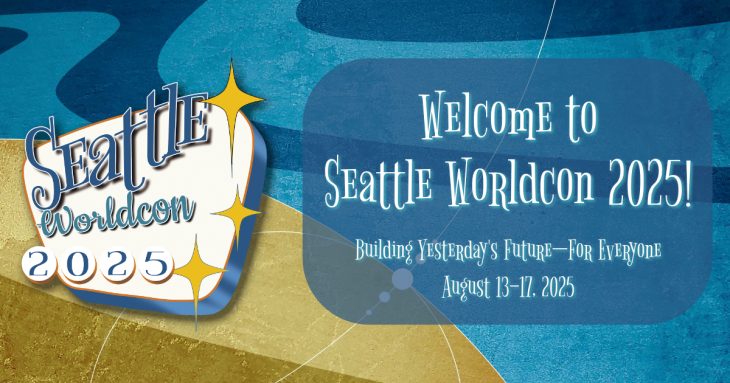
Good afterevenmorn, Readers!
I have been out of the writing world loop for a bit, being wrapped up in my own personal stuff (it’s a terrible combination of absolutely no time whatsoever, “out of sight, out of mind,” and having my head in the clouds as I’m neck deep in the first draft of a book), so I’m quite late to the party. Apparently, World Con has once again landed itself in some controversy.
Let me fill you in if you are like I was just two days ago; utterly clueless about it all.
 Image by Robert Fotograf from Pixabay
Image by Robert Fotograf from Pixabay
It appears that Worldcon 2025, which will be held in August in the fine city of Seattle, used an LLM (Language Learning Model; specifically Chat GPT) in order to vet panelists for their programming. This created quite the furor. You can read more about it in the File 770 article that covers most of it. Gizmodo also had an article about it. It’s understandable, really. There’s a lot of bad blood between creatives and the “tech bros” who stole their creations in order to train their LLMs.
I understand the impulse to use AI in order to do this, especially for a convention as huge as Worldcon. I do not volunteer for any conventions. I have no idea the amount of work involved in getting one together, but I can imagine. I expect that a good portion of manpower is devoted to vetting possible panelists and then matching them to a panel where they would be the best fit for that particular topic.
AI would likely be a godsend in cutting down the hours required to do it all. Or it would be, if there weren’t so many issues with it.
 Image by Dmitriy from Pixabay
Image by Dmitriy from Pixabay
It’s not even about stolen creations or jobs. What was taken in this case was volunteer hours. Is that better or worse? Not sure. There was one mention of why it’s not so great, and that while it might be a lot of work, it is good work, and can be a lot of fun. I cannot speak to that. But as an intention, that doesn’t seem bad to me.
At the most basic, practical level, without regard to ethics at all, LLMs are not great for vetting things. The examples of AI hallucinating are abound, and sometimes they flat out lie, or make things up and present them as facts though they don’t even exist. Wasn’t there some recent furor over an LLM citing supporting case law… by references cases that simply did not exist. The machine just… made them up. AI is constantly ascribing nonsensical things to people who had nothing to do with them, or making up answers to clearly nonsensical questions (specifically designed to prove just how unreliable the application is).
There is also the issue of the inherent bias in the data sets that is the internet. In short, the internet is a horribly bigoted place, and any LLM that gleaned its dataset from the internet is proven to be racist as all get-out.
Everything else does.
 A real firestorm
A real firestorm
Practically, it doesn’t seem great, given all the problems with AI at present (granted, as the technology improves, that will be less and less an issue). Ethically, it’s an absolute stinker.
The environmental toll of using AI is absolutely horrific. The energy and water requirements for keeping these things running as appalling. Anyone who cares remotely about the environment should have serious concerns about using it just on that alone. If all you care about is the environment, then any AI use is an absolute no-go.
Then there’s the issue of the principals. The attendees of this convention are the very kinds of people who had their creativity stolen in order to teach these LLMs. Using the exact application that thieved from the very people in attendance was probably not a great move. It’s quite a slap to the face, if you think about it. Many of those very people, based on these grounds alone, feel very strongly that there is absolutely no ethical argument for using AI.
It will not surprise anyone that I’m kinda on their side; both on the personal and environmental issues. I don’t think there can be any ethical reason to use AI. The time it might save doesn’t offset the other considerations here.
Easy for me to say, I know. I’m not trying to organize one of the biggest SFF conventions in the world. I just think that using AI was a stumble and can’t really be justified. At least, not to me.
 Thankfully unaffected this time.
Thankfully unaffected this time.
It’s become such an issue for Worldcon 2025 that three people have resigned from the board, and one author has withdrawn their books from award consideration (Yoon Ha Lee was in the running for the Lodestone Award, and withdrew following this mess). This, despite assurances that AI went nowhere near the Hugo Awards. Thankfully. I can’t imagine the mess if it had.
Honestly, in terms of controversies attached to Worldcon, this is the least aggravating for me personally. I am not in the running for a Hugo (could you imagine?), and I’m not attending Worldcon this year… or any convention in the US for the next few years. This is not the Sick Puppies, or Sick Puppies adjacent. The awards themselves appear to have maintained their integrity this year. My absolute dislike of LLMs on principal makes me dislike this situation intensely, but it’s not the worst thing that has happened to and with World Con.
Thank goodness. I don’t think my blood pressure could handle anything more egregious.
When S.M. Carrière isn’t brutally killing your favorite characters, she spends her time teaching martial arts, live streaming video games, and cuddling her cat. In other words, she spends her time teaching others to kill, streaming her digital kills, and a cuddling furry murderer. Her most recent titles include Daughters of Britain, Skylark and Human. Her serial The New Haven Incident is free and goes up every Friday on her blog.
OVERGROWTH by Mira Grant
Book Review: When the Moon Hits Your Eye by John Scalzi
I received a review copy from the publisher. This does not affect the contents of my review and all opinions are my own.
 When the Moon Hits Your Eye by John Scalzi
When the Moon Hits Your Eye by John Scalzi
Mogsy’s Rating: 2.5 of 5 stars
Genre: Science Fiction, Humor
Series: Stand Alone
Publisher: Tor Books (March 25, 2025)
Length: 326 pages
Author Information: Website
I kind of miss when John Scalzi wrote more cerebral books. Or at least stories with some real substance, like Old Man’s War, Lock In, or even his Dispatcher series of novellas. Don’t get me wrong, I still enjoy his humor, but lately his novels have started to feel more like idea sprints than anything fully developed—just throwing ideas at the wall to see what sticks. While it’s an approach that can sometimes be fun (for example, The Kaiju Preservation Society and Starter Villain both had their charms), it’s also starting to wear thin. When the Moon Hits Your Eye is the latest in this trend, delivering an off-the-wall premise with a snappy title and lots of quirk, but unfortunately not much else.
The plot of this book—such as it is—centers on an absurd astronomical event. The moon has inexplicably turned into cheese! Literally! Overnight, the world is thrown into disbelief and various degrees of panic. As governments scramble to respond, experts of all stripes start coming out of the woodwork to weigh in while the conspiracy theorists have themselves a field day. Meanwhile, ordinary folk are left helpless to parse all the noise by themselves, trying to make sense of it all.
And yet, what else is there to do? Life must go on. What follows is a series of chapters focusing on how different people from all walks of life react to the sudden lunar transformation. There are politicians and preachers, authors and screenwriters, billionaires and astronauts, and of course, everyday citizens just going with the flow in an attempt to hold on to whatever normalcy is left. Hence, the result is less of a genuine cohesive story and more of a patchwork of little vignettes, chronicling life in the United States in the time following the cheesification of the moon.
Right away, you can probably guess the downside to this narrative structure. While Scalzi’s intent appears to have been to capture a broad view of humanity’s response, what you end up with is a constant shifting of context and perspective jumps that make it very hard to connect with any of the characters or care about their situation. Some of these people are with us only very briefly, never to be heard from again as the story progresses. Those who do recur do not do so enough to act like anchors in all the chaos. Instead, readers are tossed this way and that like in a storm, with nothing concrete to hold on to.
The entire novel is also built on a premise whose potential for humor is limited and whose momentum is unsustainable. So, the moon turns into cheese, oh cool, ha ha! It’s a novelty that lasted for about five minutes, quickly becoming a tired joke that is laboriously stretched over a few hundred pages. What should have been a quick read instead took me much longer. At a certain point, I had just about enough of the book’s smugness over how clever it thinks it is. I mean, how much torture is one expected to take with the endless parade of groan-inducing cheese puns and juvenile wink-wink-nudge-nudge dialogue? What started as mildly funny quickly became irritating, especially as the novel constantly patted itself on the back even though it rarely provided anything insightful.
Granted, I am probably being harsher than I need to be. To the book’s credit, some chapters do casually wade into deeper themes of grief, mortality, and the fragile nature of human civilization in the face of catastrophe, even if the exploration is surface-level and often undermined by the writing’s tendency for glibness. And yes, there were some laugh-worthy moments here and there. For better or worse, Scalzi’s trademark voice is ever present, and in small doses, I admit it can be fun.
However, the main issue with this book is the way it always seems to be getting close to saying something important, but then backs off at the last moment, never fully committing. And so, what you end up with is mostly fluff but not the right kind for me. Bottom line, I think When the Moon Hits Your Eye would have worked much better as a novella or a proper collection of short stories. As it is, the novel overreaches and tries to be more than what its structure can maintain, so what started off as quirky and cute ends up being awkward and cringe like a joke that fizzles out.
![]()
![]()
Free Fiction Monday: Details
George has lived a full life as a decorated WWII veteran, high-end attorney, family man. But the incident that haunts him only took five minutes—five minutes when he shared a Coke with a woman on her way to California, a woman who would die hours later. Murdered. Maybe even by George.
Winner of Ellery Queen Mystery Magazine’s Readers’ Choice Award.
“Details“ is available for one week on this site. The ebook is available on all retail stores, as well as here.
Details By Kristine Kathryn Rusch
No more alcohol, no more steak. In the end, it’s the little things that go, and you miss them like you miss a lover at odd times, at comfort times, at times when you need something small that means a whole lot more.
I’ve been thinking about the little things a lot since my granddaughter drove me to the glass-and-chrome hospital they built on the south side of town. Maybe it was the look the doctor gave me, the one that meant you should’ve listened to me, George. Maybe it was the sight of Flaherty’s, all made over into a diner.
Or maybe it’s the fact that I’m seventy-seven years old and not getting any younger. Every second becomes a detail then. An important one, and I can hear the details ticking away quicker than I would like.
It gets a man to thinking, all those details. I mentioned it to Sarah on the way back, and she said, in that dry way of hers, “Maybe you should write some of those details down.”
So I am.
* * *
I know Sarah wanted me to start with what she considers the beginning: my courting—and winning—of her grandmother. Then she’d want me to cover the early marriage, and of course the politics, all the way to the White House years.
But Flaherty’s got me thinking—details again—and Flaherty’s got me remembering.
They don’t make gas stations like that no more. You know the kind: the round-headed pumps, the Coke machine outside—the kind that dispenses bottles and has a bottle opener built in—and the concrete floor covered with gum and cigarette butts and oil so old it looks like it come out of the ground.
But Flaherty’s hasn’t been a gas station for a long time. For years it was closed up, the pumps gone, plywood over the windows. Then just last summer some kids from Vegas came in, bought the land, filled the pits, and made the place into a diner. For old folks like me, it looks strange—kinda like people being invited to eat in a service station—but everyone else thinks it looks authentic.
It isn’t.
The authentic Flaherty’s exists only in my mind now, and it won’t leave me alone. It never has. And so I’m starting with my most important memory of Flaherty’s—maybe my most important memory period—not because it’s the prettiest or even the best, but because it’s the one my brain sticks on, the one I see when I close my eyes at night and when I wake bleary eyed in the morning. It’s the one I mull over on sunny mornings, or catch myself daydreaming about as I take those walks the doctor has talked me into.
You’d think instead I’d focus on the look in Sally Anne’s eyes the first time I kissed her, or the way that pimply faced German boy moaned when he sank to his knees with my knife in his belly outside of Argentan.
But I don’t.
Instead, I think about Flaherty’s in the summer of 1946, and me fresh home from the war.
* * *
I got home from the war later than most.
Part of that was because of my age, and part of it was that I’d signed up for a second tour of duty, World War II being that kinda war, the kind where a man was expected to fight until the death, not like that police action in Korea, that strange mire we called Vietnam, or that video war them little boys fought in the Gulf.
I came back to McCardle in my uniform. I’d left a scrawny teenager, allowed to sign up because old Doc Elliot wanted to go himself and didn’t want to deny anyone anything, and I’d come back a twenty-five year old who’d killed his share of men, had his share of drunken nights, and slept with women who didn’t even know his name let alone speak his language. I’d seen Europe, even if much of it’d been bombed, and I knew how its food tasted, its people smelled, and its women smiled.
I was somebody different and I wanted the whole world to know.
The whole world, in those days, was McCardle, Nevada. My grandfather’d come west for the Comstock Load, but made his money selling dry goods, and when the Load petered, came to McCardle. He survived the resulting depression, and when the boom hit again around the turn of the century, he doubled his money. My father got into government early on, using the family fortune to control the town, and expected me to do the same.
When I came home, I wasn’t about to spend my whole life in Nevada. I had the GI Bill and a promise of a future, a future I planned on taking.
I had the summer free, and then in September, I’d be allowed to go East. I’d got accepted to Harvard, but I’d met some of those boys, and decided a pricey snobby school like that wasn’t a place for me. Instead, I went to Boston College because I’d heard of it and because it wasn’t as snobby and because it was far away.
It turned out to be an okay choice, but not the one I’d dreamed of. Nothing ever quite turns out like you dream.
I should’ve known that the day I drove into McCardle in ’46, but I didn’t. For years, I’d imagined myself coming back all spit-polished and shiny, the conquering hero. Instead I was covered in the dust that rolled into the windows of my ancient Ford truck, and the sweat that made my uniform cling to my skinny shoulders. The distance from Reno to McCardle seemed twice as long as it should have, and when I hit Clark County, I realized those short European distances had worked their way into my soul.
Back then, Clark County was so different as to be another country. Gambling had been legal since I was a boy, but it hadn’t become the business it is now. Bugsy Siegel’s dream in the desert, the Flamingo, wouldn’t be completed for another year, and while Vegas was going through a population boom the likes of which Nevadans hadn’t seen since the turn of the century, it wasn’t nowhere near Nevada’s biggest city.
McCardle got its share of soldiers and drifters and cons looking for a great break. Since gambling was in the hands of local and regional folks, its effects were different around the state. McCardle’s powers that be, including my father, took one look at Siegel and his ilk and knew them for what they were. Those boys couldn’t buy land, they couldn’t even get no one to talk to them, and they moved on to Vegas, which was farther from California, but much more willing to be bought. Years later, my father would brag that he stared down gangsters, but the truth of it was that the gangsters were looking for a quick buck and they knew that they’d be fighting unfriendlies in McCardle for generations when Vegas would have them for a song.
Nope. We had our casino, but our biggest business was divorces. For a short period after the war, McCardle was the divorce capitol of the US of A.
You sure could recognize the divorce folks. They’d come into town in their fancy cars, wearing too many or too few clothes, and then they’d go to McCardle’s only hotel, built by my grandfather’s dry goods money long about 1902, and they’d cart in enough luggage to last most people a year. Then they’d visit the casino, look for the local watering holes, and attempt to chat up a local or two for the requisite two weeks, and then they’d drive off, marriage irretrievably broken. Some would go back to Reno where they’d sign a new marriage license. Others would go about their business, never to be thought of again.
In those days, Flaherty’s was on the northern-eastern side of town, just at the edge of the buildings where the highway started its long trek toward forever. Now, Flaherty’s is dead center. But in those days, it was the first sign you were coming into civilization, that and the way the city spread before you like a vision. You had about five minutes of steady driving after you left Flaherty’s before you hit the main part of McCardle, and I decided, on that hot afternoon, that five minutes was five too many.
I pulled into Flaherty’s and used one thin dime to buy myself an ice-cold Coca-Cola.
I remember it as if it happened an hour ago: getting out of that Ford, my uniform sticking to my legs, the sweat pouring down my chest and back, the grit of sand in my eyes. I walked past several cars to get to the concrete slab they’d built Flaherty’s on. A bell ting-tinged near me as someone’s tank got filled, and in the cool darkness of the station proper, a little bell pinged before the cash register popped open. Flaherty himself stood behind the register in those days, although like as not by ’46, you’d find him drunk.
The place smelled of gasoline and motor oil. A greasy Philco perched on a metal filing cabinet near the cash register, and it was broadcasting teen idol Frankie Sinatra live, a pack of screaming girls ruining the song. In the bay, a green car was half disassembled, the legs of some poor kid sticking out from under its side as he worked underneath. Another mechanic, a guy named Jed, a tough who’d been a few years behind me in school, leaned into the hood. I remembered Jed real well. Rumor had it he’d knifed an Indian near a roadside stand. I’d stopped him from hitting one of the girls in my class when she’d laughed at him for asking her on a date. After that, Jed and I avoided each other when we could and were coldly polite when we couldn’t.
The Coke bottle—one of the small ones that they don’t make any more—popped out of the machine. I grabbed its cold wet sides, and used the built-in bottle opener to pop the lid. Brown fizz streamed out the top, and I bent to catch as much of it as I could without getting it on my uniform.
The Coke was ice-cold and delicious, even if I was drinking foam. In those days, Coke was sweet and lemony and just about the best non-alcoholic drink money could buy. I finished the bottle in several long gulps, then dug in my pocket for another dime. I hadn’t realized how thirsty I was or how tired; being this close to home brought out every little ache, even the ones I had no idea that I had. I stuck the dime in the machine, and took my second bottle, this time waiting until the contents settled before opening it.
“Hey, soldier. Mind if I have a sip?”
The voice was sultry and sexy and very female. I jumped just a little at the sound. I hadn’t seen anyone besides Flaherty and the grease monkeys inside, even though I had known, on some level, that other folks were around me. I kept a two-fingered grip on the chilly bottle as I looked up.
A woman was leaning against the building. She wore a checked blouse tied beneath her breasts, tight pants that gathered around her calves, and Keds. She finished off an unfiltered cigarette and flicked it with her thumb and forefinger into the sand on the building’s far side. Her hair was a brownish red, her skin so dark it made me wonder if she were a devotee of that crazy new fad that had women lying in the sun all hours trying to get tan. Her eyes were coal-black but her features were delicate, almost as if someone had taken the image from a Dresden doll and changed its coloring to something else entirely.
“Well?” she said. “I’m outta dimes.”
I opened the bottle and handed it to her. She put its mouth between those lips and sucked. I felt a shiver run down my back. For a moment, it felt as if I hadn’t left Italy.
Then she pulled the bottle down, handed it back to me, and wiped the condensation on her thighs. “Thanks,” she said. “I was getting thirsty.”
“That your car in there?” I managed.
She nodded. “It made lots of pretty blue smoke and a helluva groan when I tried to start it up. And here I thought it only needed gas.”
Her laugh was deep and self-deprecating, but beneath it I thought I heard fear.
“How long they been working on it?”
“Most of the day,” she said. “God knows how much it’s going to cost.”
“Have you asked?”
“Sure.” She held out her hand, and I gave the bottle back to her, even though I hadn’t yet taken a drink. “They don’t know either.”
She tipped the bottle back and took another swig. I watched her drink and so did most of the men in the place. Jed was leaning on the car, his face half hidden in the shadows. I could sense rather than see his expression. It was that same flatness I’d seen just before he lit into the girl outside school. I didn’t know if I was causing the look just by being there, or if he’d already made a pass at this woman, and failed.
“You’re not from McCardle,” I said.
She wiped her mouth with the back of her hand, and gave the bottle back to me. “Does it show?” she asked, grinning.
The grin transformed all her strange features, making her into one of the most beautiful women I’d ever seen. I took a sip from the bottle simply to buy myself some time, and tasted her on the glass rim. Suddenly it seemed as if the heat of the day had grown more intense. I drank more than I intended, and pulled the bottle away only when my body threatened to burp the liquid back up.
“You just visiting?” I asked which was the only way I could get the answer I really wanted. She wasn’t wearing a ring; I suspected she was here for a quickie divorce.
“Taking in the sights, starting with Flaherty’s here,” she said. “Anything else I shouldn’t miss?”
I almost answered her seriously before I caught that grin again. “There’s not much to the place,” I said.
“Except a soldier boy, going home,” she said.
“Does it show?” I asked and we both laughed. Then I finished the second bottle, put it in the wooden crate with the first, and flipped her a dime.
“The next one’s on me,” I said, as I made my way back to the Ford.
“You’re the first hospitable person I’ve met here,” she said and I should’ve heard it then, that plea, that subtle request for help.
Instead, I smiled. “I’m sure you’ll meet others,” I said and left.
* * *
Kinda strange I can remember it detail for detail, word for word. If I close my eyes and concentrate, the taste of her mingled with Coke comes back as if I had just experienced it; the way her laugh rasped and the sultry warmth of her voice are just outside my earshot.
Only now the memory has layers: the way I felt it, the way I remembered it at various times in my life, and the understanding I have now.
None of it changes anything.
It can’t.
No matter what, she’s still dead.
* * *
I was asleep when Sheriff Conner showed up at the door at ten a.m. two mornings later. I was usually up with the dawn, but after two nights in my childhood bed, I’d finally found a way to be comfortable. Seems the bed was child-sized, and I had grown several inches in my four years away. The bed was a sign to me that I didn’t have long in my parents’ home, and I knew it. I didn’t belong here anyway. I was an adult full grown, a man who’d spent his time away from home. Trying to fit in around these people was like trying to sleep in my old bed: every time I moved I realized I had grown beyond them.
When Sheriff Conner arrived, my mother woke me with a sharp shake of the shoulder. She frowned at me, as if I had embarrassed her, and then she vanished from my room. I pulled on a pair of khakis that were wrinkled from my overnight case, and combed my hair with my fingers. I grabbed a shirt as I wandered barefoot into the living room.
Sheriff Conner was a big man with skin that turned beet-red in the Nevada sun. His blond hair was cropped so short that the top of his head sunburned. He hadn’t changed since I was a boy. He was still too large for his uniform, and his watch dug red lines into the flesh of his wrist. I always wondered how he could be comfortable in those tight clothes in that heat, but, except for the dots of perspiration around his face, he never seemed to notice.
“You grew some,” he said as the screen door slammed behind my mother.
“Yep,” I said.
“Your folks say you saw action.”
“A bit.”
He grunted and his bright blue eyes skittered away from mine. In that moment, I realized he had been too young for World War I, and too old for this war, and he was one of those men who wanted to serve, no matter what the cause. I wasn’t that kind of man, only I learned it later when I contemplated Korea and the mess we were making there.
“I guess you just got to town,” he said.
“Two days ago.”
“And when you drove in, you stopped at Flaherty’s first, but didn’t get no gas.” His tone had gotten sharper. He was easing into the questions he felt he needed to ask me.
“I was thirsty. It’s a long drive across that desert.”
He smiled then, revealing a missing tooth on his upper left side. “You bought a soda.”
“Two,” I said.
“And shared one.”
So that was it. Something to do with the girl. I stiffened, waiting. Sometimes girls who came onto a man like that didn’t like the rejection. I hadn’t gone looking for her over to the hotel. Maybe she had taken offense and told a lie or two about me. Or maybe her soon-to-be ex-husband had finally arrived and had taken an instant dislike to me. Maybe Sheriff Conner had come to warn me about that.
“You make it your policy to share your drinks with a nigra?”
“Excuse me?” I asked. I could lie now and say I was shocked at his word choice, but this was 1946, long before political correctness came into vogue, almost a decade before the official start of the Civil Rights movement, although the seeds of it were in the air.
No. I wasn’t shocked because of his language. I was shocked at myself. I was shocked that I had shared a drink with a black woman—although in those days, I probably would have called her colored not to give too much offense.
“A whole buncha people saw you talk to her, share a Coke with her, and buy her another one. A few said it looked like there was an attraction. Couple others coulda sworn you was flirting.”
I had been flirting. I hadn’t seen her as black—and yes, back then, it would have made a difference to me. I’ve learned a lot about racial tolerance since, and a lot more about intolerance. I wasn’t an offensive racist in those days, just a passive one. A man who kept to his own side of the street and didn’t mingle, just as he was supposed to do.
I would never have flirted if I had known. No matter how beautiful she was. But that hair, those features all belied what I had been taught. I had thought the darkness of her skin due to tanning not to heredity.
I had seen what I had wanted to see.
Sheriff Conner was watching me think. God knows what kind of expressions had crossed my face, but whatever they were, they weren’t good.
“Well?” he asked.
“Is it against the law now to buy a woman a drink on a hot summer day?” I asked.
“Might be,” he said, “if that woman shows up dead the next day.”
“Dead?” I whispered.
He nodded.
“I never saw her before,” I said.
“So you usually just go up and share a drink with a nigra woman you never met.”
“I didn’t know she was colored,” I said.
He raised his eyebrows at me.
“She was in the shade,” I said and realized how weak that sounded.
The Sheriff laughed. “And all pussy’s the same in the dark, ain’t it?” he said, and slapped my leg. I’d heard worse, much worse, in the army but it didn’t shock me like he just had. I’d never heard Sheriff Conner be crude, although my father always said he was. Apparently the Sheriff was only crude to adults. To children he was the model of decorum.
I wasn’t a child any longer.
“How’d she die?” I asked.
“Blow to the head.”
“At the station?”
“In the desert. Her pants was gone, and that scrap of fabric that passed for a blouse was underneath her.”
The desert. Someone had to take her there. I felt myself go cold.
“I didn’t know her,” I said, and if she had been a white woman, he might have believed me. But in McCardle, in those years and before, a man like me didn’t flirt with—hell, a man like me didn’t talk to—a woman like her.
“Then what was she doing here?” he asked.
“Getting a divorce?”
“Girls like her don’t get a divorce.”
That rankled me, even then. “So what do they do?”
He didn’t answer. “She wasn’t here for no divorce.”
“Have you investigated it?”
“Hell, no. Can’t even find her purse.”‘
“Well, did you trace the license on the car?”
He frowned at me then. “What car?”
“The ones the guys were fixing, the green car. They had it nearly taken apart.”
“And it was hers?”
“That’s what she said.” At least, that was what I thought she said. I suddenly couldn’t remember her exact words, although they would come to me later.
The whole scene would come to me later, like it was something I made up, like a dream that was only half there upon waking and then came, full-blown and unbidden, into the mind.
That your car? I said to her, and she didn’t answer, at least not directly. She didn’t say yes or no.
“Did you check with the boys at the station?” I asked.
“They didn’t say nothing about a car.”
“Did you ask Jed?”
The sheriff frowned at me. I’d forgotten until then that he and Jed were drinking buddies. “Yeah, of course I did.”
“Well, I can’t be the only one to remember it,” I said. “They had it torn apart.”
“Izzat so?” he asked, stroking his chin. “You think that’s important?”
“If it tells you who she is, it is,” I said, a bit stunned at his denseness.
“Maybe,” he said, but he didn’t seem to be thinking of that. He seemed focused on something else altogether. The look that crossed his face was half sad, half worried. Then he heaved himself out of the chair, and left without even a good-bye.
I sat on the sofa, wondering what, exactly, that all meant. I was still shaken by my own blindness, and by the Sheriff’s willingness to accuse me of a crime that seemed impossible to me.
It seemed impossible that a woman that vibrant could be dead.
It seemed impossible that a woman that vibrant had been black.
It seemed impossible, but there it was. It startled me.
I was more shocked at her color than at her death.
And that was the hell of it.
* * *
I tried not to think of it.
I’d learned how to do that during the war—it’s what helped me survive Normandy—and it had been effective during my tour.
But it stopped working about a week later when her family showed up.
They came for the body, and they seemed a lot more out of place than she had. Her father was a big man, the kind most folks in McCardle would have crossed the street to avoid or would have bullied out of fear. Her mother was delicate, with the same Dresden features as her daughter but on much darker skin. The auburn hair didn’t seem to come from either of them.
And with them was her husband. He wore a uniform, like I did, and his eyes were red as if he’d been crying for a long, long time. I saw them come out of the mortuary, the parents with their arms around each other, the husband walking alone.
The husband threw me, and made me even more uncomfortable than I had already been.
I thought she had flirted with me.
I usually didn’t mistake those things.
But, it seemed, I made a whole lot of mistakes in that short half hour I had known her.
They drove out that night with her body in the back of their truck. I knew that because my conscience forced me over to the hotel to talk to them, to ask them about the green car, and to tell them I was sorry.
When I got there, I learned that the only hotel in McCardle—my family’s hotel—didn’t take their kind. Maybe that, more than an assumption, explained the Sheriff’s remark: Girls like her didn’t get a divorce.
Maybe they didn’t, at least not in McCardle, because the town made sure they couldn’t, unless they had some place to stay.
And there weren’t blacks in McCardle then. The blacks didn’t start arriving for another year.
* * *
The next day, I moved, over my mother’s protests, into my own apartment. It was a single room with a hot plate and a small icebox over the town’s only restaurant. I shared a bathroom with three other tenants, and counted myself fortunate to have two windows. The place came furnished, and the Murphy bed was long enough for me, although even with fans I had trouble sleeping. The building kept the heat of the day, and not even the temperature drop after sunset could ease it. On those unbearable summer nights, I lay in tangled sheets, the smell of greasy hamburgers and chicken-fried steak carried on the breeze. I counted it better than being at home.
Especially after the nightmares started.
Strangely they weren’t about her. Nor were they about the war. I didn’t have nightmares about that war for twenty years, not until I started seeing images from Vietnam on television. Then a different set of nightmares came, and I went to the VA where I was diagnosed with a delayed stress reaction and given a whole passel of drugs that I eventually pitched.
No. Those early nightmares were about him. Her husband. The man with the olive green uniform and the red eyes. I knew guys like him. They walked with their backs straight, their faces impassive. They didn’t move unless they had to, and they never talked back, and if they showed emotion, it was because they thought guys like me weren’t looking.
He hadn’t cared about hiding any more. His emotion had been too deep.
And once Sheriff Conner figured out I had nothing to do with it, he’d declared the case closed. Over dinner the night before I left, my father speculated that Conner’d just shown up to show my father who was boss. Mother’d ventured that Conner hoped I was guilty, so it’d bring down the whole power structure of the town.
Instead, I think, it just brought Conner down. He was out of office by the following year, and the year after that he was dead, a victim of a slow-speed single vehicle drunken car crash in the days before seat belts.
I think no one would have known what happened if it hadn’t been for those nightmares. I’d dream in that dry, dry heat of him just standing there, looking at me, eyes red, face impassive. Her body was in the green car beside us, and he would stare at me, as if I knew something, as if I were keeping something from him.
But how could I have known anything? I’d shared a Coke with her and gone on.
I hadn’t even bothered to learn her name.
* * *
In the sixties they called what I was feeling white liberal guilt. Not that I had done anything wrong, mind you, but if I had known what she was—who she was—I would have acted differently. I knew it, and it bothered me.
It almost bothered me more than the fact she was dead.
Although that bothered me too. That, and the dreams. And the green car.
I went to Flaherty’s soon after the dreams started and filled up my tank. I got myself another Coke and I stared at the spot where I had seen her. The shadows were dark there, but not that dark. The air was cool but not that cool, and only someone who was waiting for a car would choose to wait in that spot, on that day, with a real town nearby. She must have been real thirsty to ask me for a drink.
Real thirsty and real scared.
And maybe she took one look at my uniform, and thought I’d be able to help her.
She even tried to ask.
You’re the first hospitable person I’ve met here, she’d said.
I’m sure you’ll meet others.
What she must have thought of that sentence.
How wrong I’d been.
I took my Coke and walked around the place, seeing lots of cars half finished, and even more car parts, but nothing of that particular shade of green.
Her family had taken her home in a truck.
The car was missing.
And as I leaned on the back of that brick building, the bottle cold in my hand, I wondered. Had the mechanics started working on the car because they too hadn’t realized who she was? Had she gotten all the way to Nevada traveling white highways and hiding her darker-than-expected skin under a trail of moxie?
I went into the mechanic’s bay, and Jed was there, putting oil into a 1937 Ford truck that had seen better days. A younger man stood beside him, and I wagered from the cut of his pants and the constant movement of his feet, that he’d been the guy under the car that day.
I leaned against the wall, sipping my Coke, and watched them.
They got quiet when they saw me. I grinned at them. I wasn’t wearing my uniform that day, just a pair of grimy dungarees and a t-shirt. Even so, I was hot and miserable, and probably looked it.
I tilted my bottle toward them in a kinda salute. The younger man, the one I didn’t recognize, nodded back.
“You seen that girl the other day?” I asked. I might have said more. I try not to remember. I can’t believe the language we used then: Japs and niggers and wops; the way we got gypped or jewed down; laughing at the pansies and whistling at the dames. And we didn’t think nothing of it, at least I didn’t. Each word had to be unlearned, just as—I guess—it had to be learned.
Jed put a hand on his friend’s arm, a small subtle movement I almost didn’t see. “Why’re you askin’?” And I could feel it, that old antipathy between us. Every word we’d ever exchanged, every look we had was buried in those words.
He wouldn’t talk to me, not really. He wouldn’t tell me what I needed to know. But his friend might. I had to play that at least.
“I was wondering if she’s living around here.” I said with an intentional leer.
“You don’t know?” the younger asked.
My heart triple-hammered. I knew then that the sheriff hadn’t told anyone he’d come after me. “Know what?”
“They found her in the desert with her face bashed in.”
“Jesus,” I said softly, then whistled for good measure. “What happened?”
“Dunno,” Jed said, his hand squeezing the other boy’s arm. Jed saw my gaze drop to his fingers, and then go back to his face. He grinned, like we were sharing a secret. And I didn’t like what I was thinking.
It seemed simple. Too simple. Impossibly simple. A man couldn’t just sense that another man had done something wrong. He needed proof.
“Too damn bad,” I said, taking another swig of my Coke. “I woulda liked a piece of that.”
“You and half the town,” the younger one said, and laughed nervously.
Jed didn’t laugh with him, but stared at me with narrowed green eyes. “I can’t believe you didn’t hear of it,” he said. “The whole town’s been talking.”
I shrugged. “Maybe I wasn’t listening.” I set the Coke down beside the radio and scanned the bay. “What’re they gonna do with that car of hers? Sell it?”
“Ain’t no one found it,” the younger boy said.
“She drove it outta here?” I asked. “She said it seemed hopeless.”
Finally Jed grinned. He actually looked merry, as if we were talking about the weather instead of a murder. “Women always say that.”
I didn’t smile back. “What was wrong with it?”
“You name it,” the younger one said. “She’d driven that thing to death.”
I knew one more question would be too many, but I couldn’t stop myself. “She say why?”
“You gotta reason for all this interest, George?” Jed asked. “You can’t get nothing from her now.”
“Guess not,” I said. “Just seems curious somehow. Woman comes here, to this town, and ends up dead.”
“Don’t seem curious to me,” Jed said. “She didn’t belong here.”
I stared at him a moment. “People don’t belong a lotta places but that don’t mean they need to die.”
He shrugged and turned away, ending the conversation. I picked up my Coke bottle. It had gotten warm already. I took another sip, letting the sweet lemony taste and the carbonation make up for the lack of coolness.
Then I went outside.
What did I want with all this? To get rid of some guilt? To make the dreams go away?
I didn’t know, and it angered me.
“Hey.” It was the younger one. He’d come out into the sun, ostensibly to smoke. He lit up a Chesterfield and offered me one. I took it to be companionable, and we lit off the same match.
Jed peeked out of the bay and watched for a moment, then disappeared, apparently satisfied that nothing was going to be said, probably thinking he had the kid under his thumb. Only Jed was wrong.
The younger one spoke softly, so softly I had to strain to hear, and I was standing next to him. “She said she was driving from Mississippi to California to join her husband. Said he’d got back from Europe and got a job in some plant in Los Angeles. Said they’d make good money there, but they didn’t have it now, and could we do as little as possible on the car, so that it’d be cheap.”
“Did you?” I asked. And when he looked confused, I added for clarification, “Keep it cheap?”
He took a long drag off the cigarette, and let the smoke out his nose. “We didn’t finish,” he said.
I felt that triple-hammer again. A little bit of adrenaline, something to let me know that I was going somewhere. “So where’s the car?”
“We left it in the bay. Next morning, we come back and it’s gone. Jed, there, he cusses her out, says all them people are like that, you can’t trust ’em for nothing, and that was that. Till the sheriff showed up, saying she was dead.”
The car I saw couldn’t have been driven, and the woman I saw couldn’t have fixed it. She would not have stopped here if she could.
“You left the car in pieces?” I asked. “And it was gone the next day? Someone drove it out of here?”
He shrugged. “Guess they finished it.”
“That would’ve taken some know-how, wouldn’t it?”
“Some,” he said. He flicked his cigarette butt onto the sandy gravel. I glanced up. Jed was staring us from the bay. I felt the hair on the back of my neck rise.
I took another drag off my cigarette and watched a heat shimmer work its way down the highway. The boy started walking away from me.
“Where was she?” I asked. “When you left? Where was she?”
And I think he knew then that my interest wasn’t really casual. Up until that point, he could have pretended it was. But at that moment, he knew.
“I dunno,” he said, and his voice was flat.
“Sure you do,” I said. I spoke softly so Jed couldn’t overhear me.
The man looked at my face. His had turned bright red, and beads of sweat I hadn’t noticed earlier were dotting his skin. “I—left her outside. Near the Coke machine.”
With a car that didn’t run, and no place to take her in for the night.
“Did you offer to give her a lift somewhere?”
He shook his head.
“Was the station still open when you left?”
“For another hour,” he said.
“Did you tell the sheriff this?”
He shook his head again.
“Why not?”
He glanced at Jed, who had crossed his arms and was leaning against the bay doors. “I didn’t think it was none of his business,” the boy whispered.
“You didn’t think, or Jed there, he didn’t think.”
“Neither of us,” the boy said. “Jed told her she could sleep in there by the car. But it woulda been an oven, even during the night. I think she knew that.”
“Is that where she slept?”
“I dunno.” This time the boy did not meet my gaze. Sweat ran off his forehead, onto his chin, and dripped on his shirt. He didn’t know, and he was sorry.
And so was I.
If I was going to pursue this logically, then I had to think logically. And it seemed to me that whoever killed the girl had known about the car. I couldn’t believe she would have talked to anyone else—I suspected she only spoke to me because I was in uniform. And if I made that assumption, then the only other people who would have known about her, about the car, about the entire business were the people who worked the station.
“Who was working that night?” I asked.
“Mr. Flaherty,” he said.
Mr. Flaherty. Mac Flaherty, whom I’d known since I was a boy. He was a hard decent man who expected work out of his employees, payment from his customers, and good money for a job well done. I’d seen Mac Flaherty in his station, at church, and at school getting his son, and I couldn’t believe he had killed someone.
But then, I had. I had killed a lot of boys overseas, and I would have killed more if Hitler hadn’t proved he was a coward and did the world a favor by dying by his own hand.
And the Mac Flaherty who ran the station now wasn’t the same man as the one I’d known. I’d learned that much in my few short days in McCardle.
A shiver ran down my back. Then I headed inside, looking for Mac Flaherty, and finding him.
* * *
Mac Flaherty was drunk. Not falling down, noticeable drunk, but his daily drunk, the kind that made a man a bit blurry around the edges, kept him from feeling the pain of day-to-day living, and kept him working a job he no longer liked.
Once Flaherty’d loved his work. It had been obvious in the booming way he’d greet new customers, in the smile he wore every day whether going or coming from work.
But then he left for the war, like I did, only he came back in ’43 minus three fingers on his left hand to find his wife shacking up with the local undertaker, and a half-sibling for his son baking in the oven. The wife, not him, took advantage of the McCardle’s divorce laws, and Flaherty was never the same. She and the undertaker left that week, and apparently, Flaherty never saw his kid again.
I went inside the service station’s main area, and the smell of beer mixed with the stench of gasoline. Flaherty was clutching a can, staring at me.
“You harassing the kid?” he asked.
“No,” I said, even though I felt that wasn’t entirely true. “I was just curious about the woman who died.”
“She something to you?” Flaherty asked.
“Only met her the once,” I said.
“Then what’s the interest?”
“I don’t know,” I said, and we both seemed surprised by my honesty. “Your boy says he left her sitting outside. That true?”
Flaherty shrugged. “I never saw her. Not when I locked up.”
“What about her car?”
“Her car,” he repeated dully. “Her car. I had it towed.”
“At night?”
“That morning,” he said. “When it became clear she skipped out on me.”
“Towed where?” I asked.
“My place,” he said. “For parts.”
And those parts had probably already been taken, along with anything incriminating. I didn’t say that aloud, though.
“You have any idea who killed her?” I asked.
“What do you care?” he asked, gaze suddenly back on me, and sharper than I would have expected.
I thought of Jed then, Jed as I’d seen him that day, staring at me, that flat look on his face. “If Jed killed her—”
“I didn’t see Jed touch nobody,” Flaherty said. “And I wouldn’t say if I did.”
I froze. “Why not?”
Flaherty frowned, his eyes small and bloodshot. “He’s the best mechanic I got.”
“But if he killed someone—”
“He didn’t kill no one.”
“How can you be so sure?”
“What happened, happened,” Flaherty said. “Let’s not go wrecking more lives.” Then he grabbed the bottle of beer he’d been nursing, and took a sip, his crippled hand looking unbalanced in the grimy afternoon light.
* * *
By the time I got back with the sheriff, Jed was gone. Not that it mattered. The case went down on the books as unsolved. What else could it have been with the other kid denying he’d even talked to me, and Mac Flaherty swearing that the girl’d been fine when he drove by at midnight, fine and unwilling to leave her post near the Coke machine. He’d winked at the sheriff when he’d told that story, and the sheriff seemed to accept it all.
I went to Jed’s apartment, and found the door open, all his clothes missing, and a neighbor who said that Jed had run in, not even bothering to change, and packed a bag, took some money from a jam jar he’d had under his bed, and disappeared down the highway, never to be seen again.
He’d been driving one of Flaherty’s rebuilds.
When I found out, I told the sheriff, and the sheriff’d been unimpressed. “Man can leave town if’n he wants,” the sheriff said. “Don’t mean he killed nobody.”
No, I suppose it didn’t. But it seemed like a huge coincidence to me, the girl getting beaten to death, Jed watching us talk, and then, when he knew I’d left for the law, disappearing like he did.
It was just the sheriff saw no percentage in pursing the case. It’d been interesting when he could come after me because of my family, because of the power we had, but it soon lost its appeal when the girl’s family took her away. Took her away, and pointed the finger at a good local boy, a mechanic who could down some beers and tell great jokes, who’d gone off to serve his country same as the rest of us. Jed had had worth to the sheriff; the girl had had none.
* * *
I don’t know why he killed her. We’ll never know now. Jed disappeared but good, and wasn’t heard from until five years ago, when what was left of his family got an obituary mailed to them from somewhere in Canada. He’d died not saying a word—
* * *
Sorry. Got interrupted there. Was going to come back to it this afternoon, but things changed this morning.
About nine a.m., I walked into my front room, buttoning one of my best shirts in preparation for yet another meeting with that pretty doctor down at the glass-and-chrome White Elephant, when I saw Sarah sitting in my best chair, feet on the footstool my granny hand-stitched, and all forty hand-written pages of this memory in her hands. She was reading raptly which I found flattering for the half second it took to realize what she was doing. I didn’t want any one to read this stuff until I was dead, and here was my granddaughter staring at the pages as if they were something outta Stephen King.
She looked up at me, her heart-shaped face so like Sally Anne’s at that age that it made my breath catch, and said, “So you think you’re some bad guy for failing this woman.”
I shook my head, but the movement didn’t stop her.
“You,” she says, “who’ve done more for people—black, white or purple—than anyone else in this town. You, who went and opened that civil rights law practice back east, who fought every racist law and every racist politician you could find. For godssake, Gramps, you marched with Dr. King, and you were a presidential advisor on Civil Rights. You’re the kinda man who shows the rest of us how to live our lives, and you’re feeling like this? You’re being silly.”
“You don’t understand,” I said.
“Damn straight,” she said, and I winced, as I always do, at the sailor language she uses. “You shouldn’t be mulling over this any more. You did what you could, and more, it seems, than anyone else.”
“And even that wasn’t enough.”
“Sometimes,” she said, “that happens, Gramps. You know that. Hell, you taught it to me.”
Seems I did. But that wasn’t the point either, and I didn’t know how to tell her. So I didn’t. I took the papers from her, put them back on my desk where they belonged, and let her drive me to the doctor so that they both could feel useful.
And all the way there and all the way back, I thought about how to make my point so that girls like her would understand. You see, the world is so different now, and yet it’s still the same. Just the faces change, and a few of the rules.
These days, Jed would’ve been arrested, or the sheriff would’ve been bounced out of office, or the press’d make some huge scandal over the whole thing.
But it wouldn’t be that simple, because pretty women don’t approach strange men any more, especially if the strange men are in uniform, and pretty women certainly don’t wait alone in gas stations while their cars are being repaired.
But they’re still dying, because they’re women or because they’re black or because they’re in the wrong place at the wrong time, and there’s so damn many of them we just shrug and move on, shaking our heads as we go.
But that isn’t my point. My point is this:
I wouldn’t have marched with Dr. King if it weren’t for that poor girl, and I wouldn’t have made it my life’s work to stamp out all the things that cause the condition I found myself in that hot afternoon, the condition that would have led me to ignore a girl if I’d noticed the true color of her skin.
Because I think I know why she died that day. I think she died because she’d flirted with me.
And that just wasn’t done between girls like her and men like me.
Jed wouldn’t have taken her to the desert if she were white. He would’ve thought she had family, she had someone who missed her. He might have roughed her up for talking to me. He might have had a few words with me.
But he didn’t. I did something unspeakable to people of our generation, and he saw a way to get back at me. If I’d talked to her, then I’d want to do what was probably done to her before she died. And if she’d fought, then I’d have bashed her. That’s what the sheriff was thinking. That’s what Jed wanted him to think.
And all because of who she was, and who I was, and who Jed was.
The sad irony is that if I’d kept my place, she’d be alive, and because I didn’t, she was dead. That had bothered me then, and bothers me now. Seems a man—any man—should be able to talk to whomever he wants. But what bothered me worse was the fact that when I learned, on the same morning, that she was black and that she was dead, it bothered me more that she was black and that I had talked to her.
It just wasn’t done.
And I was more worried about my own blindness than I was about one woman’s life.
Since that day, hers is the face I see every morning when I wake up, and every night when I doze. And, if God gave me the chance to relive any day in my life, it’d be that one, not, strangely, the day I enlisted or the day I deliberately misunderstood that German kid asking for clemency, but the day I inadvertently led a pretty girl to her death.
White liberal guilt maybe.
Or maybe it was the last straw, somehow.
Or maybe it was the fact that I had so much trouble learning her name.
Learning her name was harder than learning the identity of the man who killed her. It took me three more weeks and a bribe to the twelve-year-old son of the owner of the funeral home.
Not that her name really mattered. To me or to anyone else.
But it mattered to her, and to that man in uniform with the red, red eyes. Because it was the only bit of her that couldn’t be sold for parts. The only bit she could call completely hers.
Lucille Johnson.
Not quite as exotic as I would have thought, or as fitting to a woman as beautiful as she was. But it was hers. And in the end, it was all she had.
It was a detail.
An important detail.
And one I’ll never forget.
___________________________________________
“Details“ is available for one week on this site. The ebook is available on all retail stores, as well as here.
Details
Copyright © 2018 by Kristine Kathryn Rusch
First published in Ellery Queen’s Mystery Magazine, December 1998
Published by WMG Publishing
Cover and Layout copyright © 2018 by WMG Publishing
Cover design by WMG Publishing
Cover art copyright © Amuzica/Dreamstime
This book is licensed for your personal enjoyment only. All rights reserved. This is a work of fiction. All characters and events portrayed in this book are fictional, and any resemblance to real people or incidents is purely coincidental. This book, or parts thereof, may not be reproduced in any form without permission.
Virtual Sci-Fi/Fantasy Book Recommendations Event
Starting this month, I’ll be doing some quarterly virtual book recommendation events with the Ashland Public Library! I’ll be sharing some fantasy and science fiction book recommendations on Zoom on from 6:30 to 7:00 PM EDT on Thursday, May 15, and if you want to join us for the first of these events later this month, you can register here.
The post Virtual Sci-Fi/Fantasy Book Recommendations Event first appeared on Fantasy Cafe.

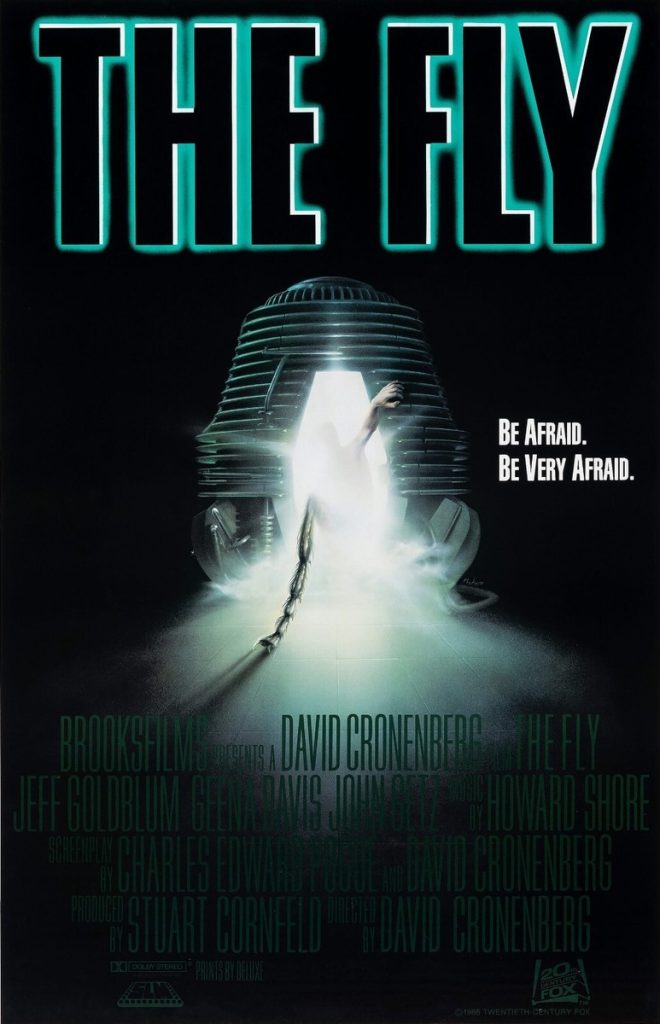
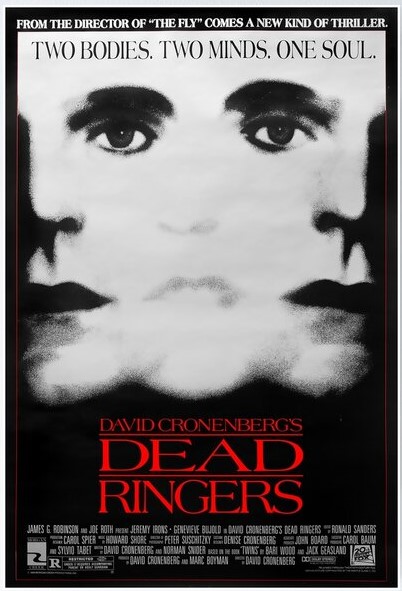
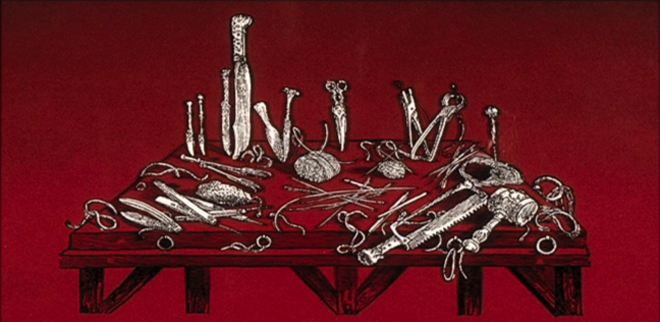
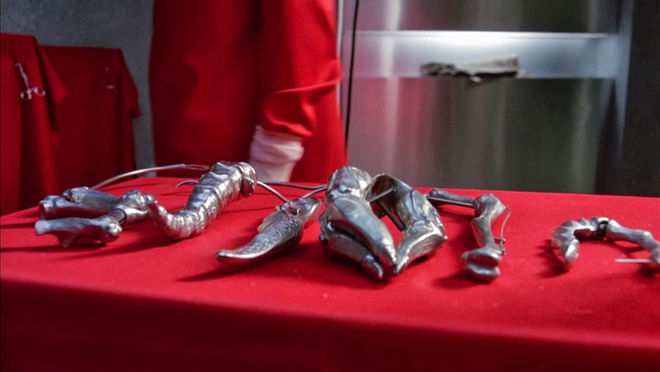
Recent comments